Defense site Lostarmour.info released a detailed analysis (LINK) of the battle in the Artillery Academy in western Aleppo in the period between August 6, 2016 and September 5, 2016.
SF provides an abridged translation of the fourth part (source) of this series. Pics are taken from the original text.
- The English version of the FIRST PART IS HERE;
- The English version of the SECOND PART IS HERE;
- The English version of the THIRD PART IS HERE.
THE FOURTH PART
On August 31, the story repeated. The T-72 battle tank moved to a banket near the road
and threw few rounds in the direction of the academy
Then a Shilka self-propelled gun replaced it.
A series of rounds hit the top floor of the Yellow Building and its rear part.
Artillery units shelled the area of the artillery college.
It looks like that the situation encouraged the command staff’s optimism. A crew of ANNA News arrived in the noon. It received a proposal to move to the aviation college by a BMP vehicle.
A loading took place in the yard. The BMP driver helped a journalist to set up a GoPro camera on the tower.
All passengers took their places.
The BMP-1 vehicle started its trip.
A soldier used a hand-rail because the BMP vehicle was shaking.
The vehicle was reaching the road.
The BMP driver increased the speed and closed the hatch.
The video allows to see the burned BMP vehicle on the road.
The vehicle passed it.
The depot was the first stop.
RT’s drone allows to get a general look at the area.
A look at defenses of the site.
We could see a flimsy wall with apertures narrowed with whatever comes to hand. Holes in the wall allows to see that the wall does not defend from heavy machine gun-like weapons (probably it can stop 7.62 round). The building itself is likely always full of dust if it’s under fire. No doubts why both sides run from this site after any sign of an advance on it.
A majority of soldiers don’t wear helmets. Helmets could be seen near the aperture .(right corner) A lack of body armours is also the issue. However, the video allows to see an interesting person in a body armour and a helment. (left corner)
Who is the? Commander? Nope, the t-shirt allows to understand who is that. It’s a passenger of the BMP – Russian jouranlist, Evgeny Poddubnyy.
It’s a bad idea to advice Poddubny about a personal security. Nonetheless, it seems that his look makes him an attractive target for militants including snipers. An expensive body armour and helmet and a lack of personal weapon make him alike to a military adviser. A lack of a portable radio set is the only difference. However, this time Poddubny had a competitor.
Black glasses, a baseball cap, a helmet, a body armour, elbow-pads, knee-pads, cartridge pouches etc… Meanwhile, the real military commander looked this way.
No arms, no body armour, two radio sets (one – to contact soldiers, another one – to contact the command staff). The video says that he’s a brigadier general. However, there were only about two dozens of soldiers in the building.
The BMP beeped and all moved to the next target.
A look at the damaged BMP-2 vehicle.
Few seconds in the vehicle and we could see the aviation college.
The main entrance.
The college and’s rooms were damaged. However, mock missiles survived.
Soldiers took firing positions inside the building.
The college allows to see the auto station, the Ramouseh roundabout and the militants’ supply line (where it crosses the roundabout).
This is why militants were defending the college. This is a look in another direction: the artillery college, the pumping station and a building near the college.
During the first visit of the academy on August 17, we could see some Arabic words on its walls. Probably militants believed that Arabic words were not enough to deliver the message to the message to the international audience. So they added some comments in English.
There were some problems in English grammar but it’s possible to read “JIBHAT ALNUSRA” and “TAVHID VE JIHAD”. Furthermore, “moderate rebels” forgot that for that Jabhat al-Nusra had changed its name to Jabhat Fateh al-Sham. But who cares?
A building near the academy was the deepest position of Liwa al-Quds.
It’s marked with a square on the map.
Journalists of ANNA News visited it and provided a look at the militant-held part of the complex.
The video allows to see soldiers deployed to the area and their commander (one radio-set means that he only receives commands and does not manage other groups of fighters).
The commander said that there are only 3 high buildings inside the complex: the aviation college, the Yellow Building and the artillery college – as soon as they are captured, the complex will be under the control of government forces.
Great words.
Some shooting for the camera.
All returned to the BMP vehicle and moved back.
The damaged BMP vehicle was still remaining on the road.
There could be an impression that bodies of dead soldiers were still remaining on the road, but these were just stains.
When the vehicle reached a high place, it came under fire. However, the SPG round glanced from the vehicle.
This BMP lacked luck.
It’s nice that all finished ok. But some questions appear. Could the command order the Shilka self-propelled gun or battle tanks to suppress militant firing positions the militant-held area around the Yellow House? Was it really needed to send two TV crews through a live fire zone? The two BMP had been already damaged on this road and the militant firing positions were not captured.
Following the incident, the Shilka self-propelled gun started shelling of militant positions.
The artillery college was also shelled.
In the evening of the same day, the BMP made another journey to the aviation college. A problem occurred during the return. While the vehicle was preparing to move back, the ATGM crew was preparing for a strike.
The quality of the video is low but it’s possible to see elements of the academy building and some person near the rear of the BMP vehicle.
The ATGM was launched.
The missile was flying 6-8 seconds from the firing position to the target. The BMP driver used this time in order to avoid the missile hit.
The fast start and the manoeuvring allowed to avoid a direct hit.
The vehicle continued moving through the clouds. Red circle shows a lamp on the tower.
It’s clear that the manoeuvring was result of the characteristics of the road. They were not a skillful attempt to avoid the missile. They key role played the moment when the vehicle started moving.
On September 1, the situation was relatively calm. Government forces continued artillery strikes and airstrikes on the artillery college. The pumping station near the artillery college was heavily damaged. Meanhile, government forces were concentrating means and measures and militants didn’t likely have resources for major counter-attacks. During the night, government forces evacauted the damaged T-72 battle tank. Active developments took place on September 2.
Controlling the partly captured Yellow Building and the nearby buildings, militants were able to shell a supply line to government troops in the aviation college. This is why government forces attempted to solve this problem.
The two-storey buildings were the main obstruction for taking full control over the Yellow Building. They overlooked the area near the Yellow Building and were enough solid to remain under the shelling.
The advance started when the Shilka self-propelled gun launched shelling of these buildings.
A drone video allows to see the same moment.
An impact of the Shilka’s shelling.
The Yellow Building could be found by the two damaged BMP vehicles near it.
Three BMP vehicles were deployed to strengthen government forces in the Ramouseh Artillery Academy complex. The first reached the depot. The second reached the dining facility. The third reached the Yellow Building and when it was moving back the vehicle was hit from the direction of the garage and stopped.
Following the hit at the BMP vehicle, the shelling of the nearby buildings increased with heavy machine guns.
The fire hit the top floors of the Yellow Building.
The Shilka self-propelled gun’s shelling peneterated the Yellow Building.
Meanwhile, the ATGM crew is searching for another target.
The BMP vehicle near the dining facility became it. We also could see an armoured recovery vehicle, the tower of the BMP-2 vehicle with opened hatches and a soldier on the steps.
The hit.
The missile hit the right side of the vehicle. There was no fire. Nonetheless, the BMP motor is located in this part of the vehicle. So, the BMP was likely heavily damaged.
Units deployed in the complex needed supplies. Thus, another BMP vehicle was deployed.
The results of the day: Two BMP were damaged, a new one was deployed.
Meanwhile, the ATGM crew was ready for another shot.
A busy work was taking place near the steps. The newly arrived BMP vehicle was unloading. One soldier was near the damaged BMP-2 vehicle and another was at its armour. Most likely, this disoriented the ATGM gunner: militants believed the soldiers were near the newlly arrived vehicle.
Another hit.
The vehicle started burning.
In turn, government forces resumed shelling of the garage with machine guns.
The recently arrived BMP vehicle moved back. The BMP-1 vehicle remained near the burning BMP-2 vehicle. Maybe the BMP driver was injured or he bewared an explosion of the ammunition load in the burning vehicle.
A drone look at the situation.
A look at the same site in the morning on September 3.
We could see the BVP-1 AMB-S vehicle, the wreckage of the red and white jeeps, and the rear of the BMP-2 vehicle with opened hatches. The armoured recovery vehicle was near behind a tree. The damaged BMP-1 vehicle is on the foreground of the image near another tree.
Another BMP-1 vehicle was en route to the depot.
Its rear hatch was opened and the vehicle lacked a hood.
It looks like government forces took a pause after the recent losses. No active military developments took place during the day. Another offensive attempt took place on the night of Sptember 3 to 4. The offensive was launched in the direction of the Ramouseh neighborhood and the artillery college. Meanwhile, the Tiger Forces advanced from the Um Al Qara hill into the area of the armament college.
Militants opened a harassing mortar fire on the military dirt road and the nearby area of the Hamadaniyah neighborhood.
The further government advance became slower. The BMP-1 vehicle continued shuttle voyages to the aviation college.
The Yellow Building and the nearby buildings were captured and the BMP was moving with an opened hatch. The damaged BMP vehicles were evacuated from the road. The burned and damaged BMP vehicles remained near the Yellow Building.
The ANNA News crew was near the area closer to the evening and…
A Syrian flag was spotted at the steps. The Tiger Forces reached the artillery college and linked up with government troops advancing from the Hamadaniyah neighborhood.
Soldiers celebrated firing in the air.
People were congratulating each other.
The BMP-1 vehicle reached the yard. A covered truck moved to the depot.
This vehicle avoided a hit on August 31 and survived on September 2. (when many BMP vehicles were hit) But the question is why does the BMP need a gunner if no BMP fires at militants during voyages. Probably, the answer is that the second member of the crew helps to unload the vehicle and replases the driver if it’s needed.
The BMP evacuated bodies of the dead soldiers.
Journalists along with soldiers move to the aviation college.
A high ground on the road allows to see the Yellow Building.
The Yellow Building was the main firing position used by militants to shell government forces moving on the road.
The building was under the control of the army, but soldiers were bowing down on the road.
The damaged vehicles were still in the area near the depot. The truck was behind the corner of the building.
The BVP-1 AMB-S vehicle, the armoured recovery vehicle and the BMP-2 vehicle. The BMP-1 vehicle with a turned tower also remained there. Oil stains could be seen near it.
A closer look at the burned BMP-2 vehicle.
Russian words could be seen on the side of the armoured recovery vehicle.
Journalists and soldiers entered the depot.
“Syria! Russia!”
A big group of soldiers was moving from Hamadaniyah.
Some command staff were likely arriving. (two flags, many journalists)
The group reached the steps.
It should be noted that many people forecasted that something would happen and took their phones.
Meanwhile, militants that were preparing to leave the area noted the noise.
And launched a missile at a group of soldiers near the depot.
Nonetheless, a majority of soldiers entered the building.
A light in the left corner of the image is a bonfire.
The hit.
The missile likely hit a group of the damaged vehicles. It’s not clear what vehicle was hit but probably it was the BMP-2. ANNA News journalists also believed that the BMP-2 was the target, but they filmed the bonefire.
One soldier was killed.
The commander was not injured. He participated in a body swap in October.
The same person was filmed in the Handarat camp.
ANNA News journalists were also ok. The well-known BMP arrived the area.
Bodies of the dead soldiers were prepared for an evacuation.
The person killed during the last ATGM strike was not in a body bag.
Journalists moved to the Yellow Building.
The BMP moved to the corner of the depot to take the bodies and became the target of another ATGM strike.
Nonetheless, the missile missed. There were no reports about casualties among the troops.
The shots fired from the area of the armament college could be seen in the air. Government forces were celebrating.
Militants were shelling the lost area from the 1070 Apartment Apartment Project.
Liwa al-Quds fighters were also satisfied.
This was the end of the battle for the Artillery Academy complex. Let’s take a look at the battlefield next morning.
The BVP-1 AMB-S vehicle was moved from the depot to the road. This means it could be recovered.
The burned BMP vehicle remained near the Yellow Building. Another vehicle was evacuated.
A look at the Hamadaniyah neighborhood.
The police UAZ vehicle was near the Yellow Building. The damaged BMP vehicle was absent near the building. The damaged BMP-1 vehicle was also removed from the road between the Yellow Building and the depot.
A look from the other side: the Yellow Building, the damaged Hell Cannon, the damaged BVP-1 AMB-S vehicle and two government fighters.
The same Hell Cannon.
The same BVP-1 AMB-S vehicle.
A look at the Yellow Building from the side of militants.
There were holes in the roof from artillery strikes and holes on the first floor made by militants for entering the building.
Government troops invited journalists inside.
There were many bodies.
A look at the destroyed building of the artillery college and the Hikmah school behind it.
A look at the same area from a drone belonging to the Russia1 TV channel crew.
We could see Eugene Poddybniy and a white jeep hidden under the shed.
The damaged building of the artillery college and a look at the direction of the 1070 Apartment Project.
The same place – the burned vehicle.
Another look at the same vehicle near the artillery college. Another burned vehicle could be seen behind it.
A damaged bulldozer that could be seen from a drone on August 5.
Dead bodies.
Another body at the same area.
Another was inside the ruins.
The buildings didn’t defend militants from artillery strikes.
This was a mortar position of militants.
The destroyed building near the depot.
The wreckage of the container with submunitions.
The burned tank remained at the same place.
The August 7 video showed the same tank. (red square)
The burned BMP vehicle was at the armament college.
The same vehicle.
The August 5 video also shows it.
The soldier filmed on August 31 in the aviation college survived during the battle. (He’s with a cigarette)
The damaged pumping station.
The burned BMP-2 vehicle was near the depot and the armoured recovery vehicle was behind it.
The ruins and the burned trees.
The Artillery Academy complex reminds some place after a preliminary artillery bombardment during the WW1: all buildings were damaged, trees were burned.
Mohammad al Saeed was quite popular among journalists.
Mohammad al Saeed met Suheil al-Hassan (a commander of the Tiger Forces) in the well-known yard in the Hamadaniyah neighborhood.
A group photo.
The Russian Defense Ministry estimated high the contribution of Liwa al-Quds to the battle for Aleppo. Mohammad al Saeed and Mohammad Rafi received decorations.
A Syrian flag was placed on the building of the artillery college.













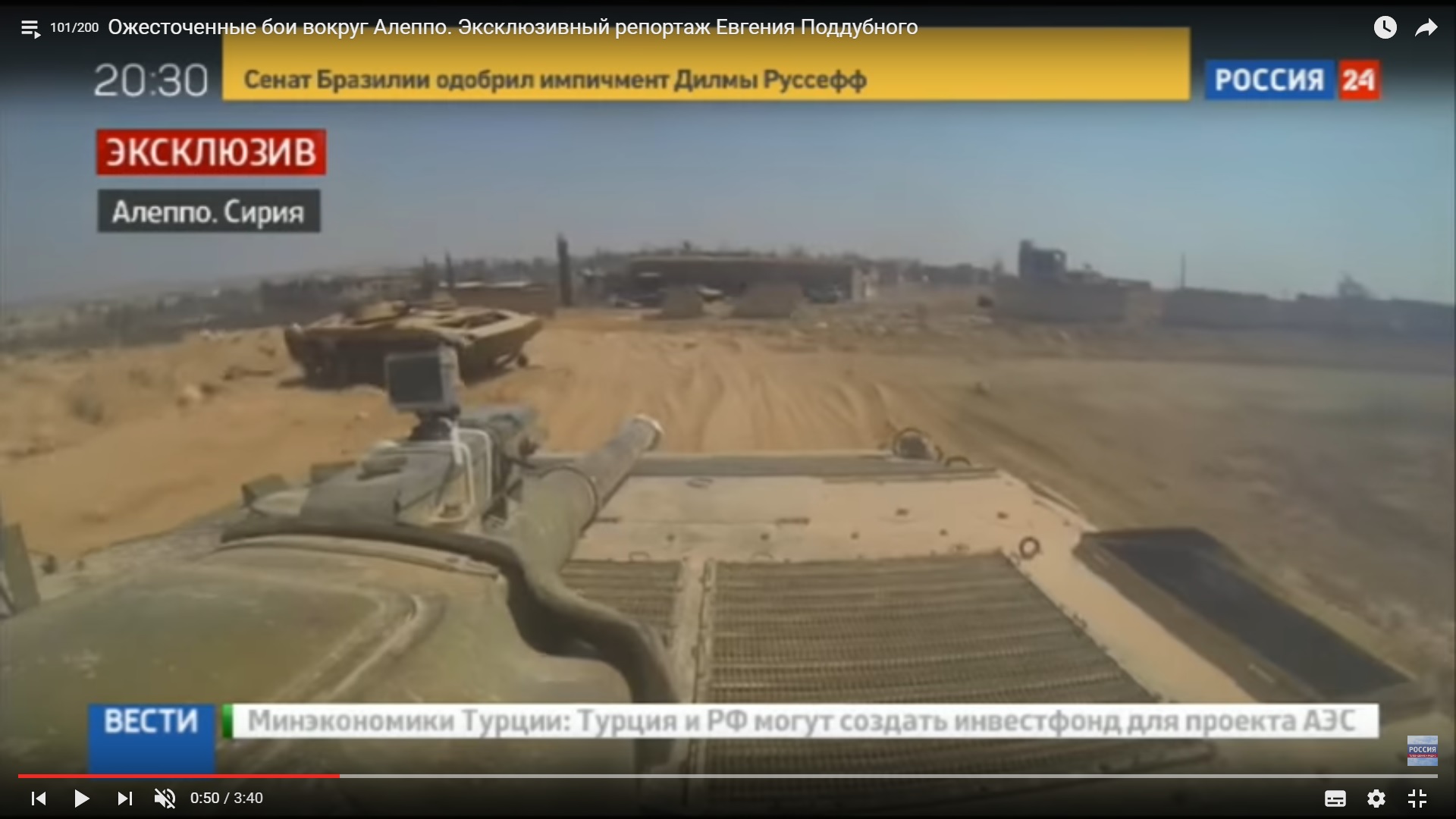


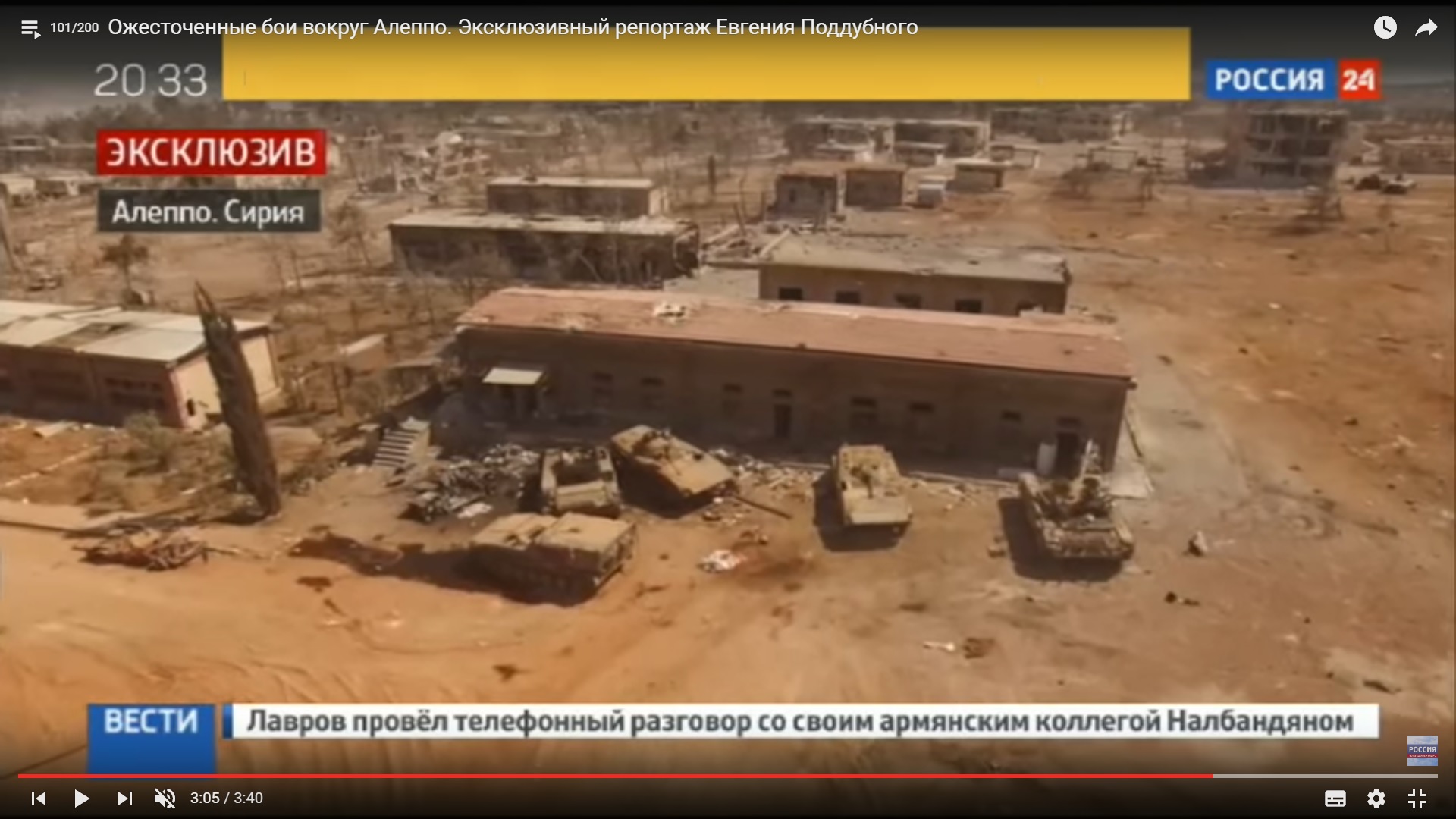










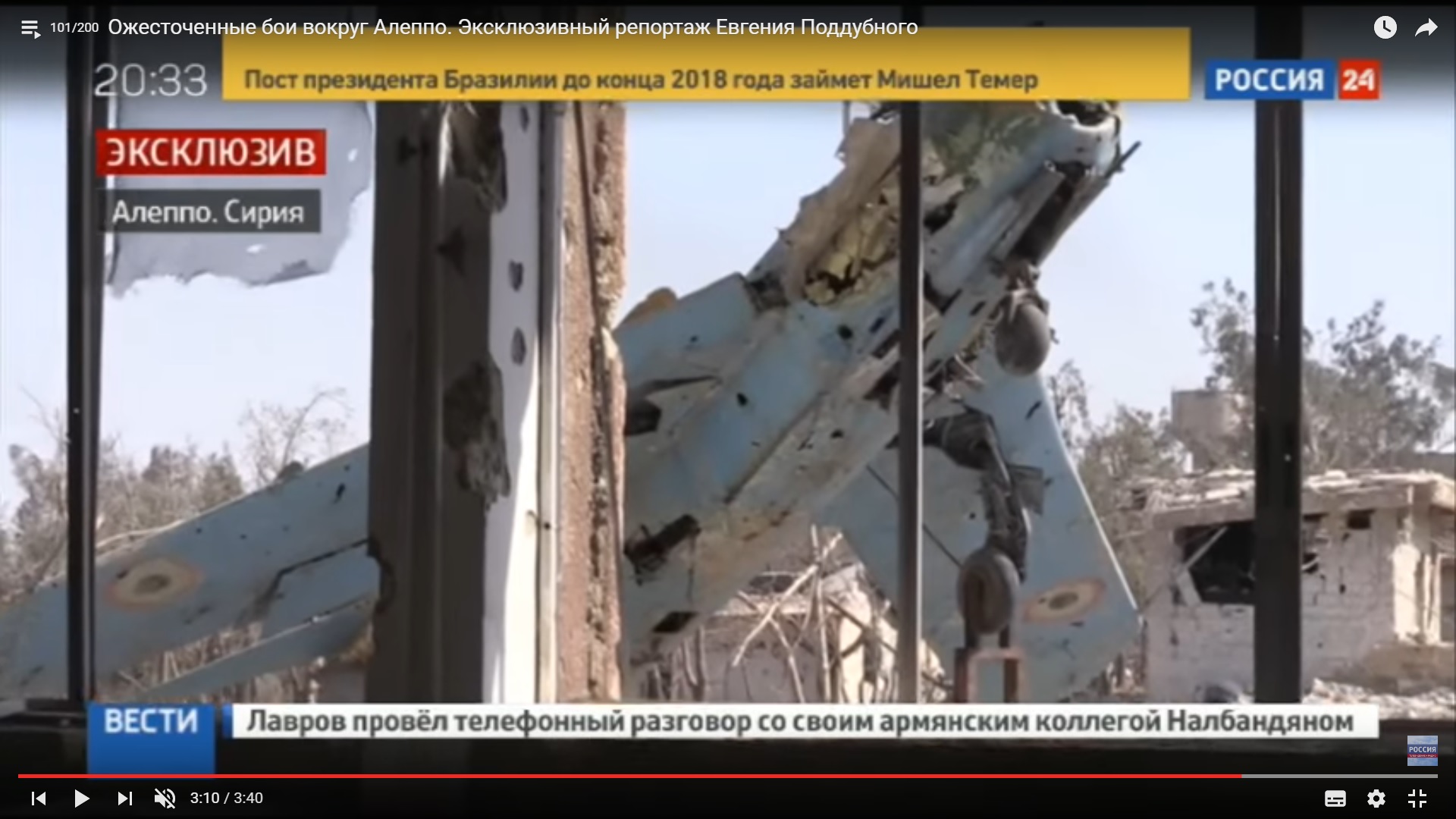
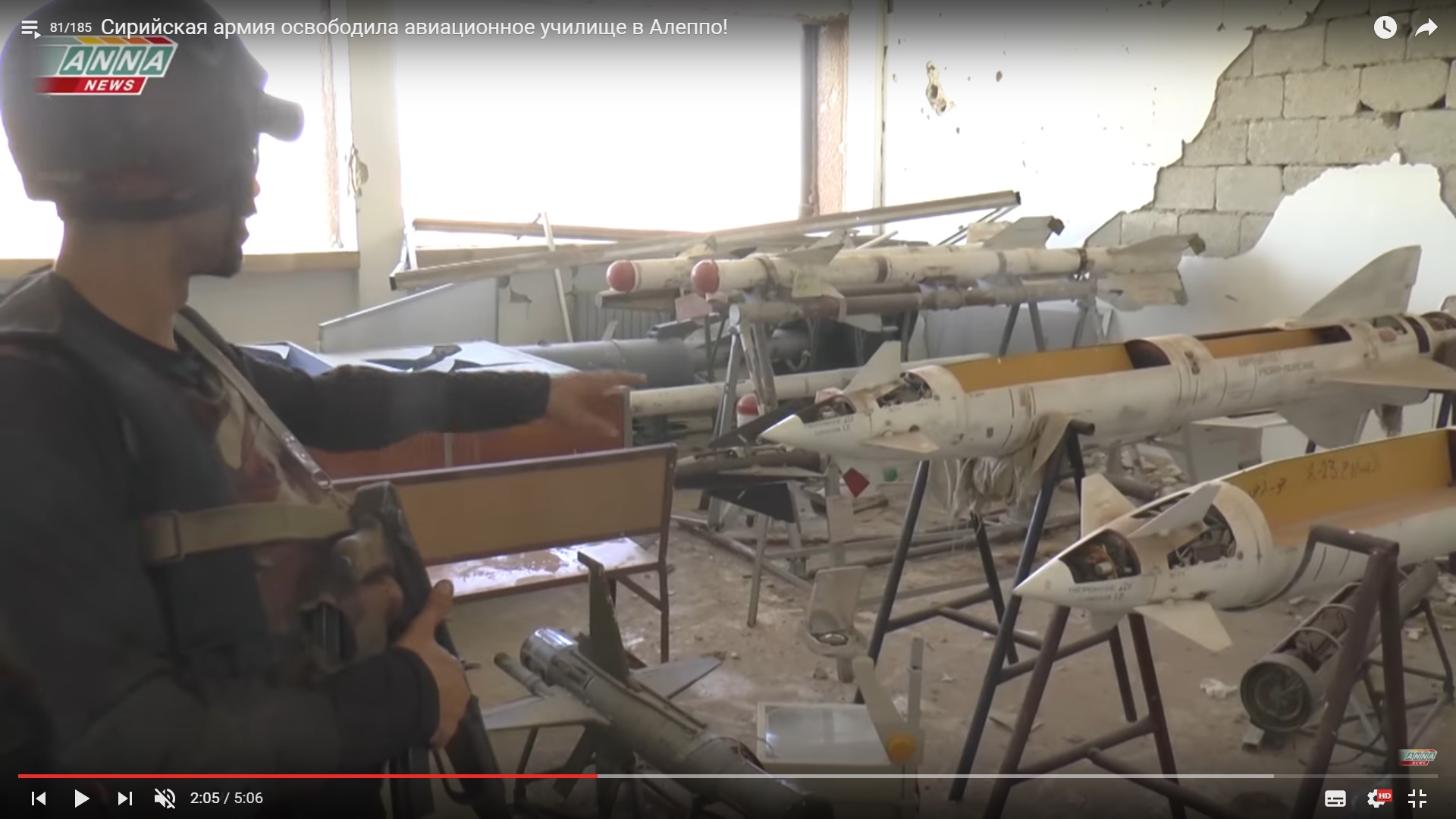






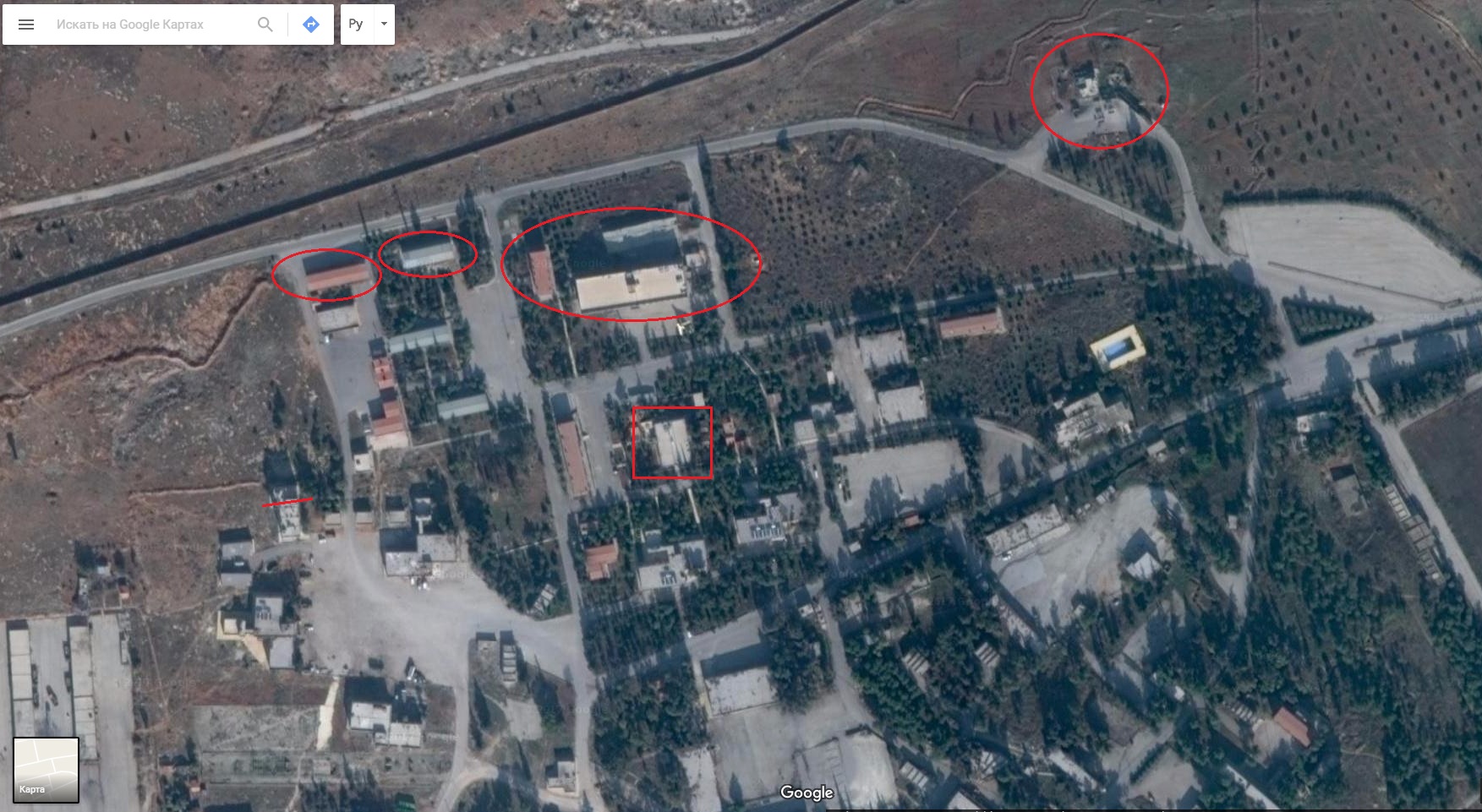








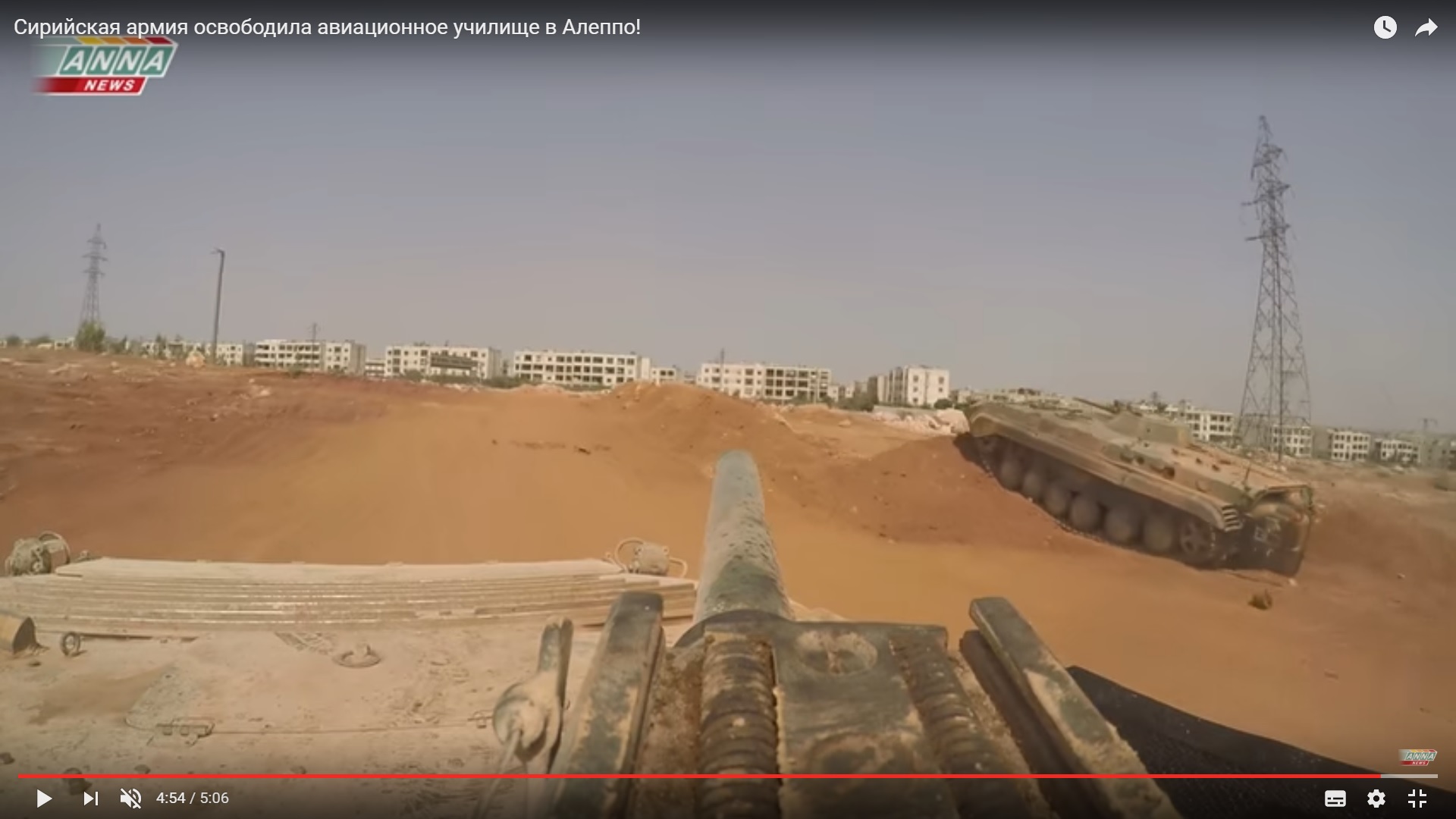


















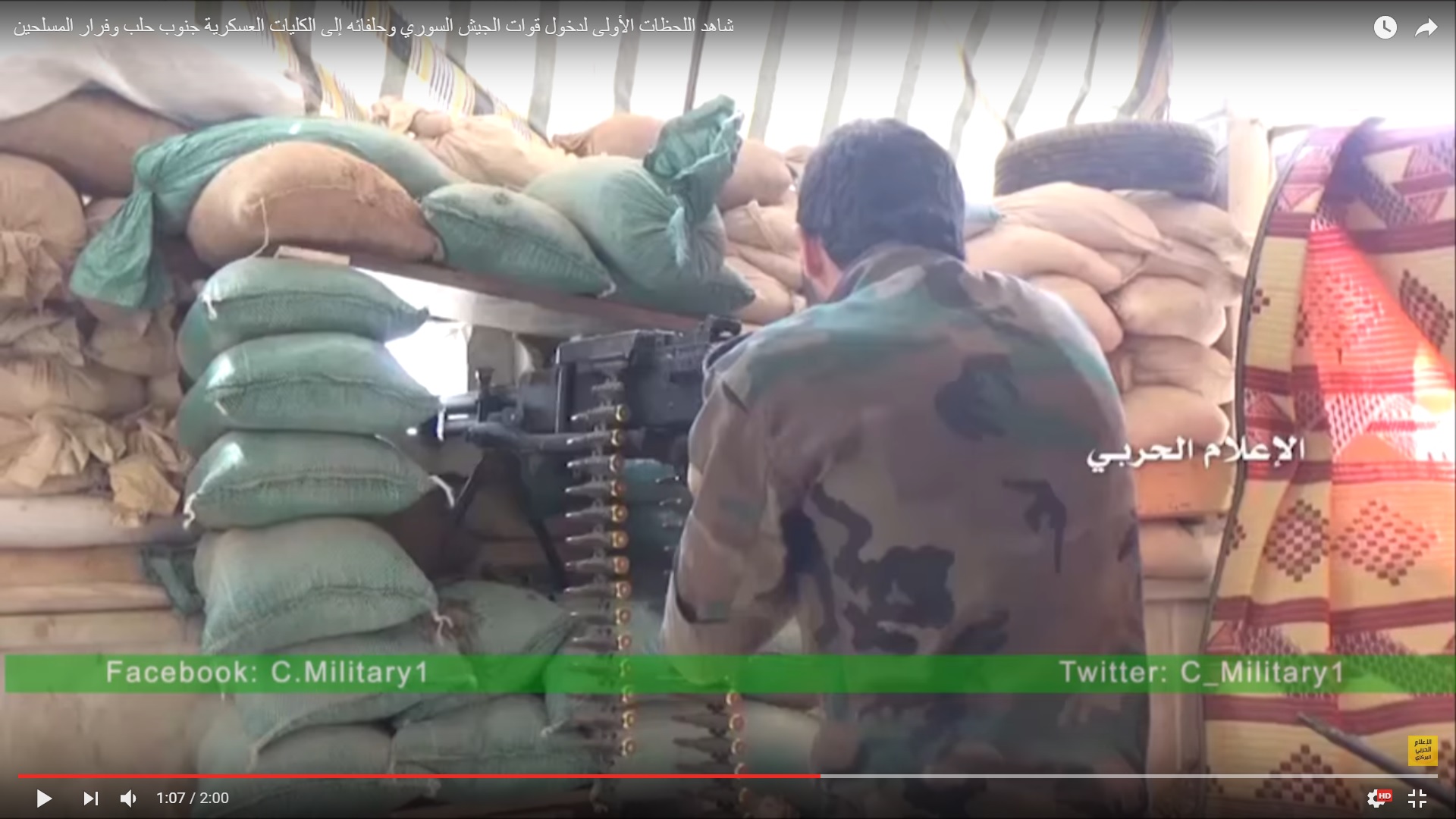
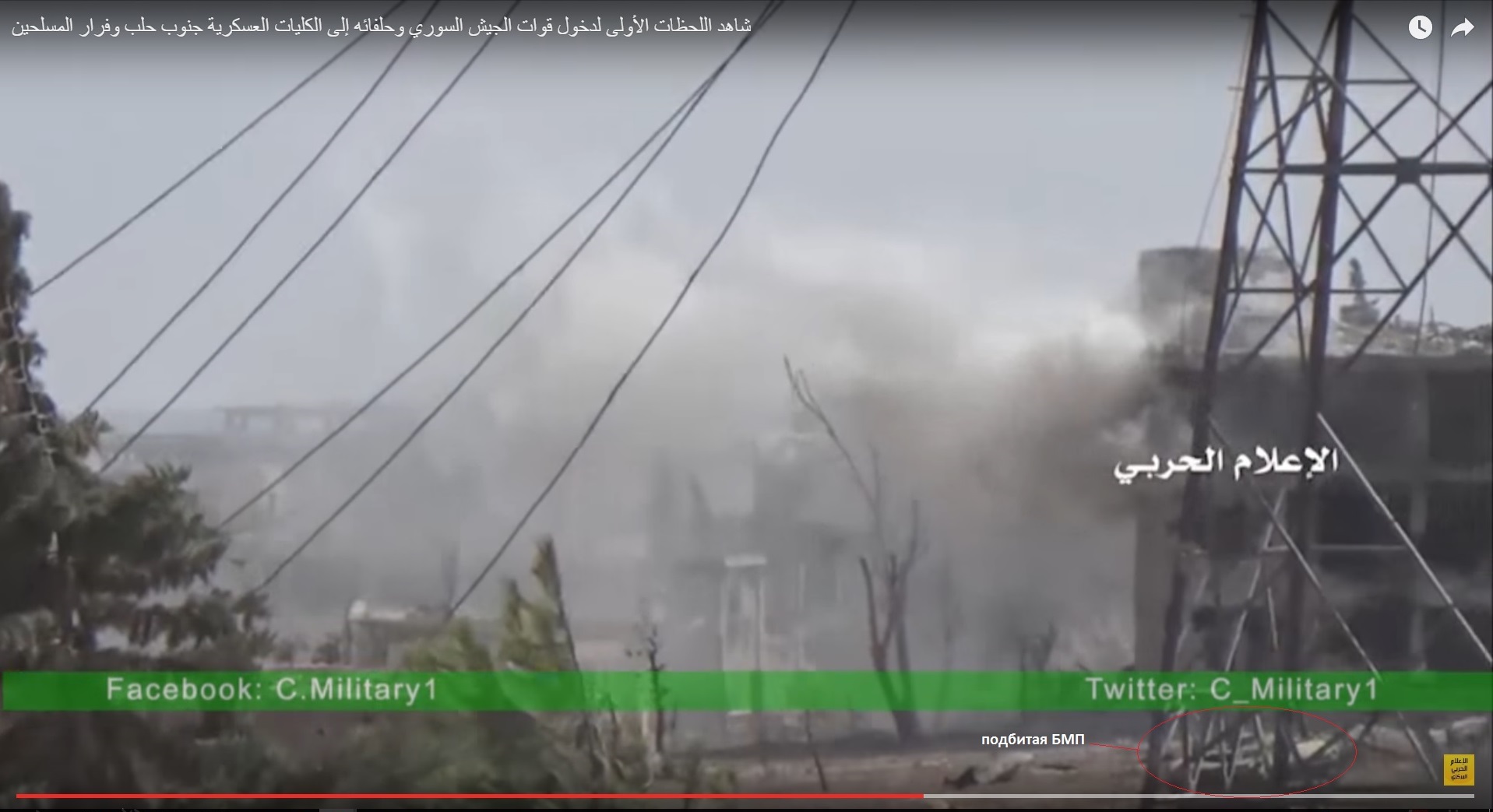








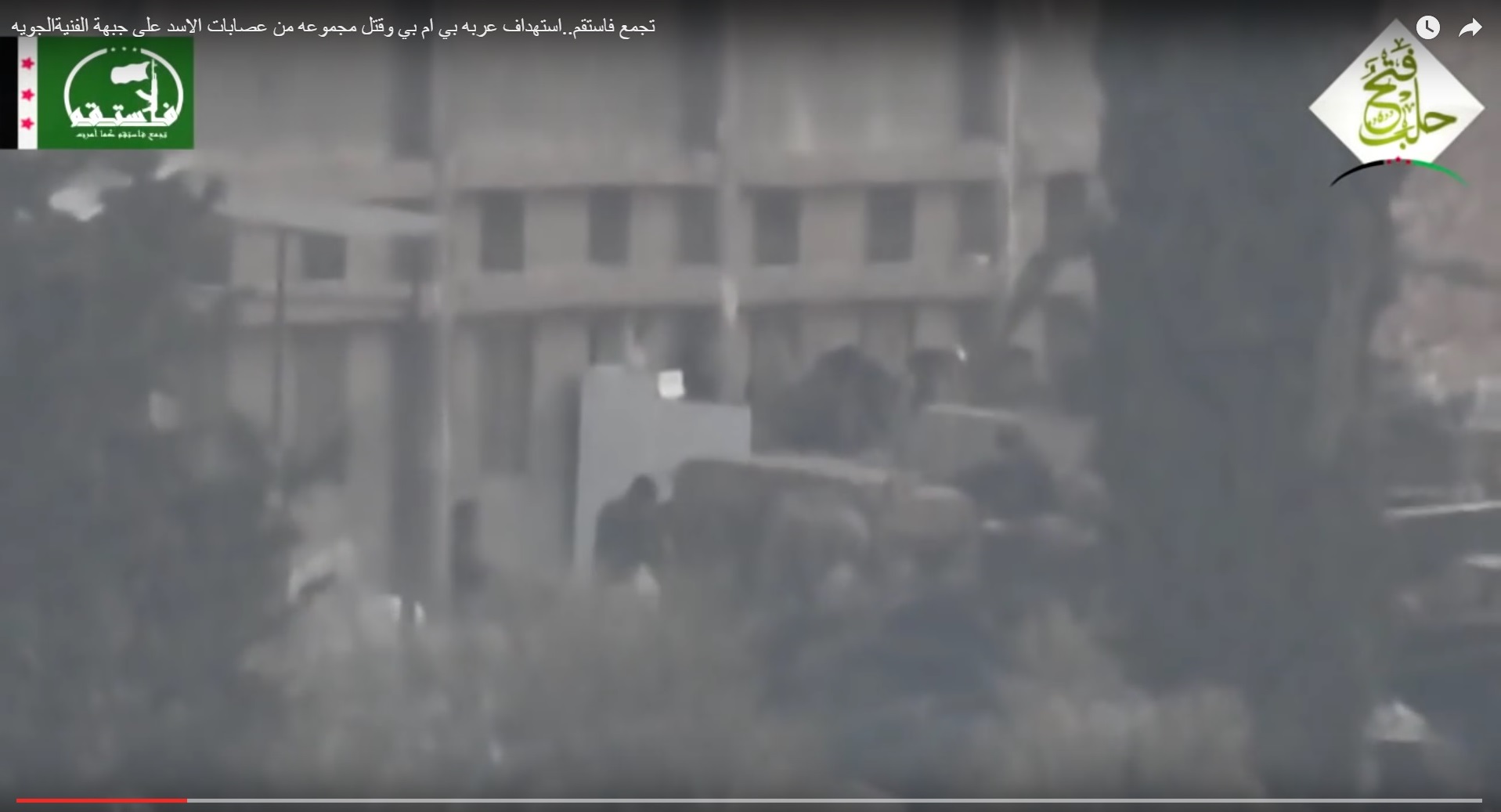









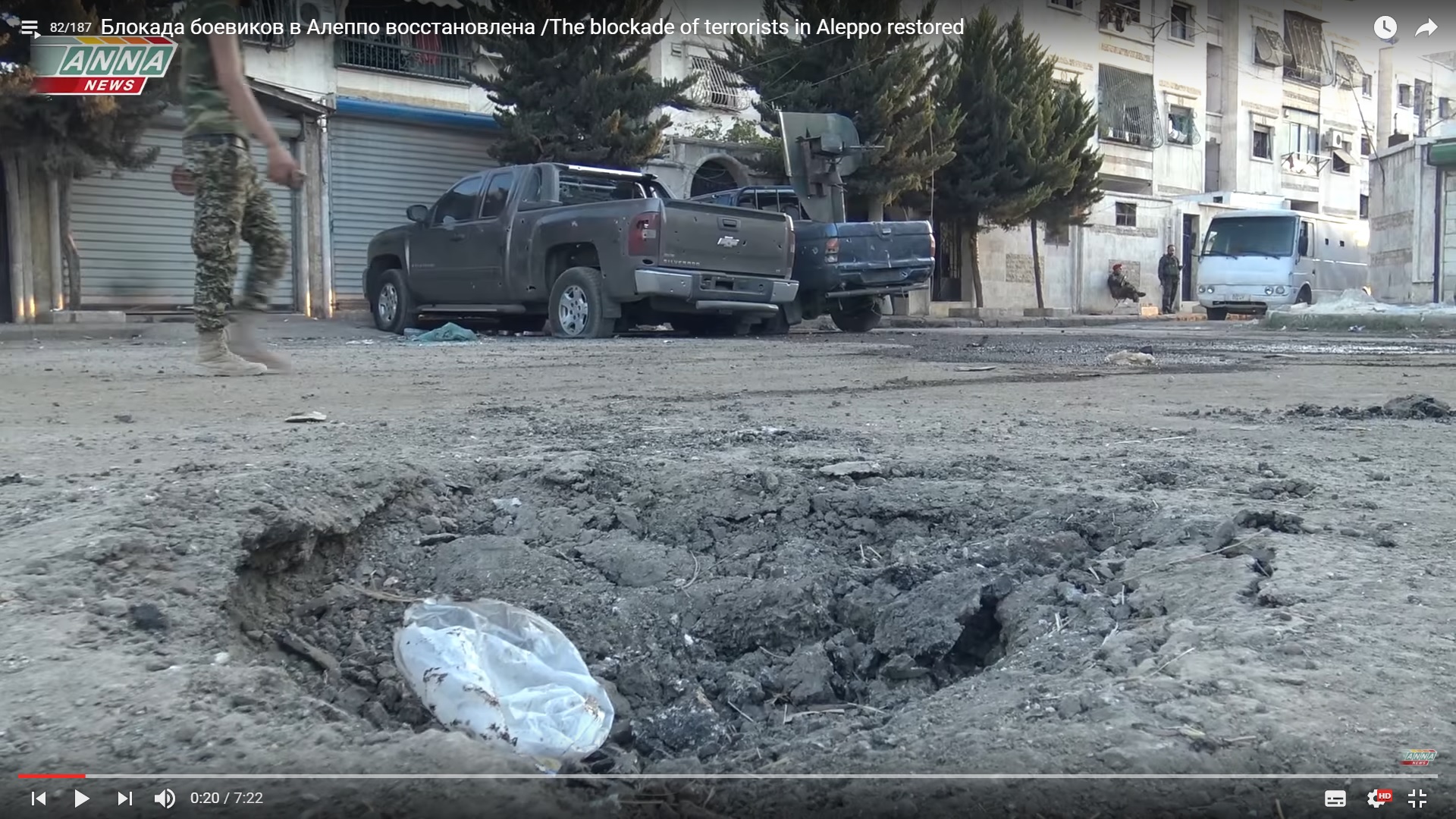









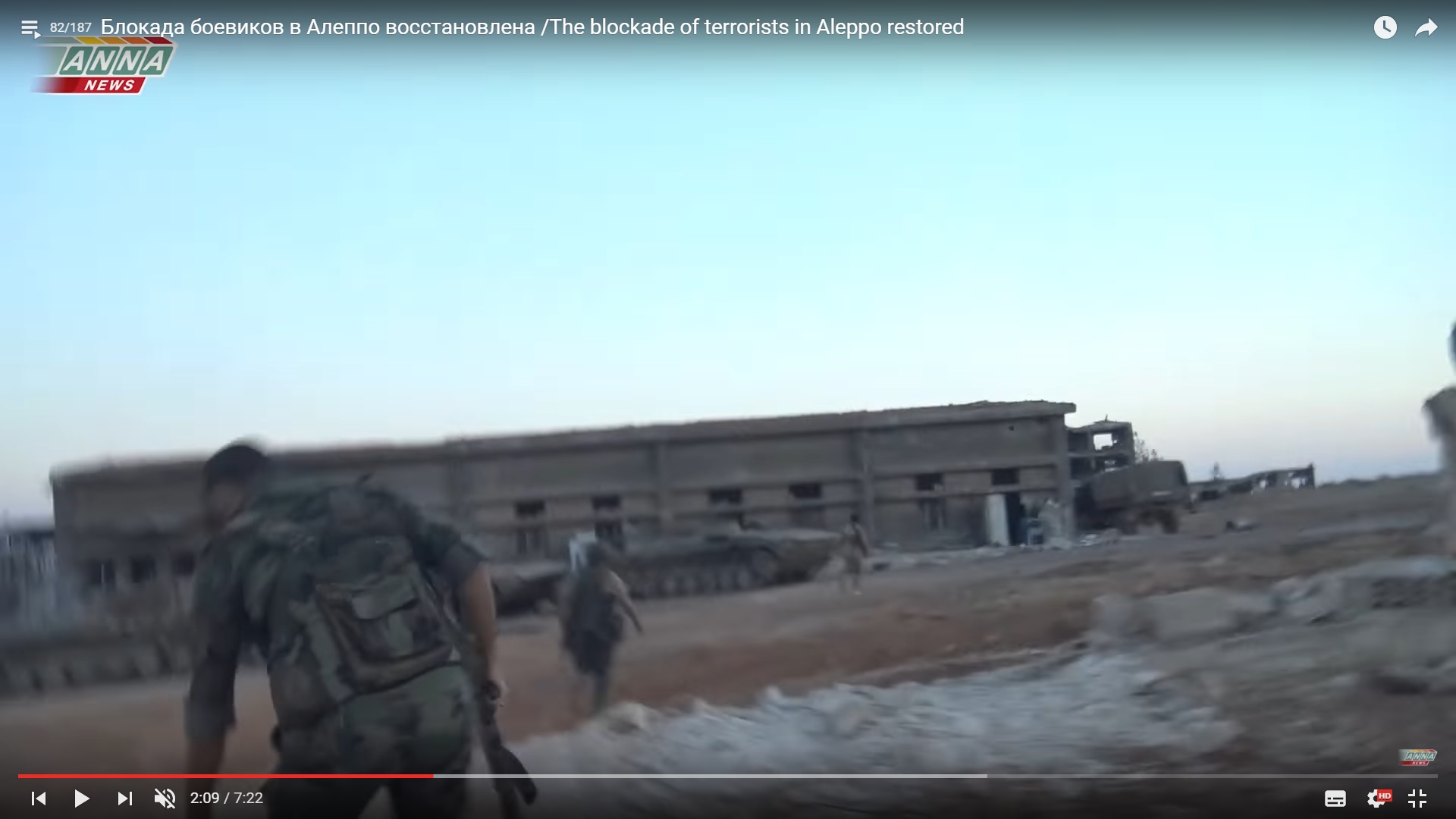


















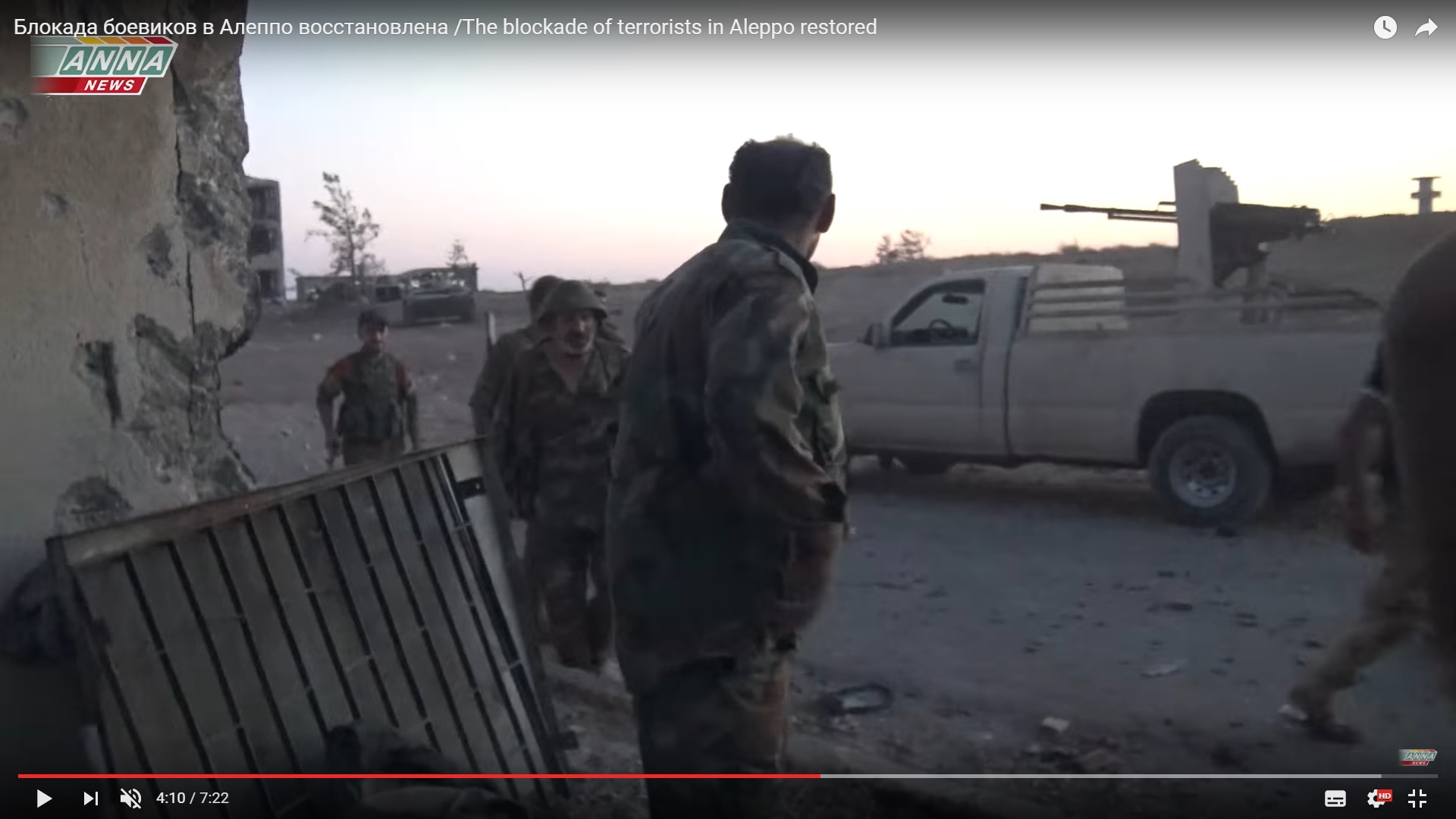
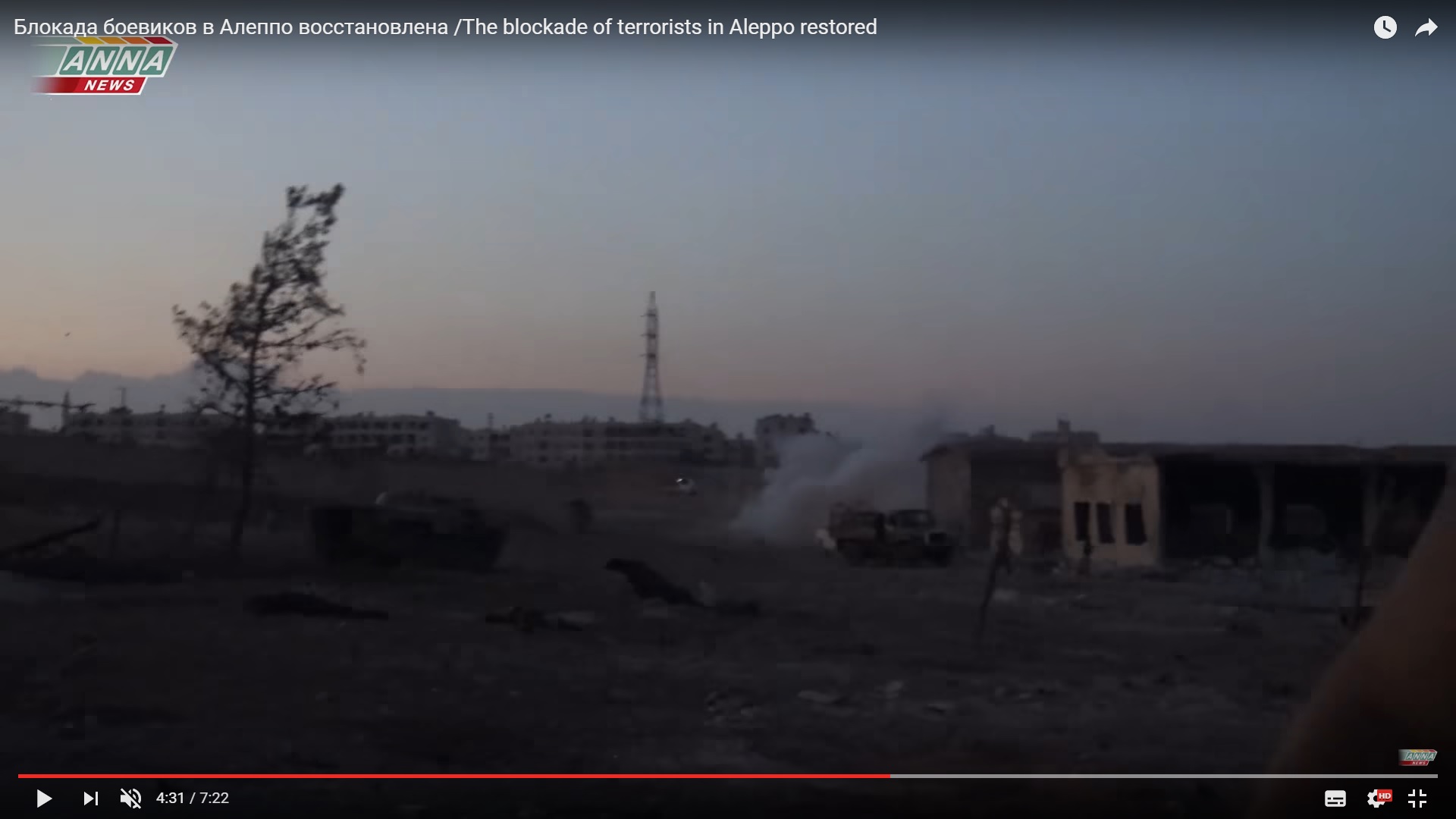
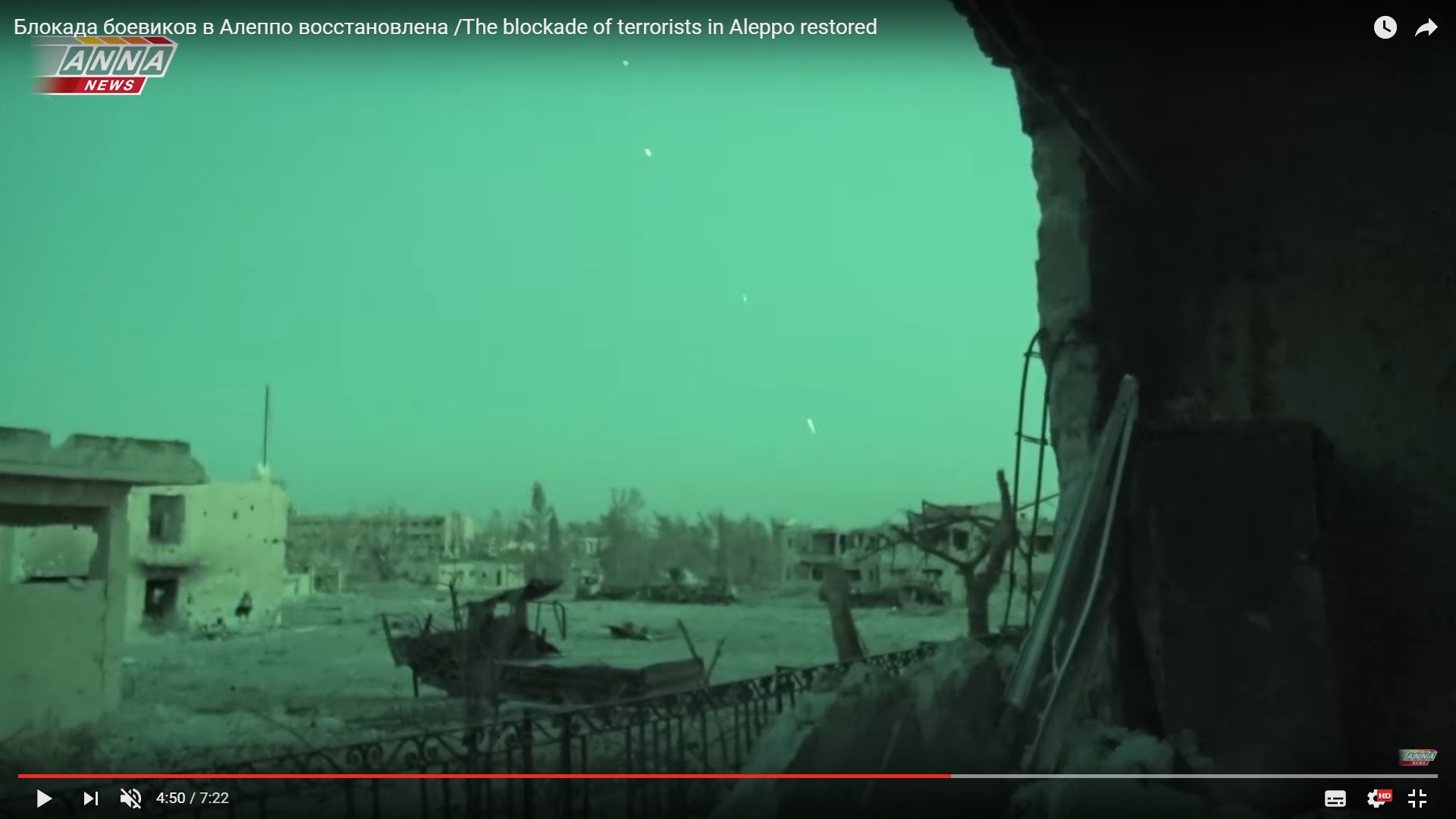
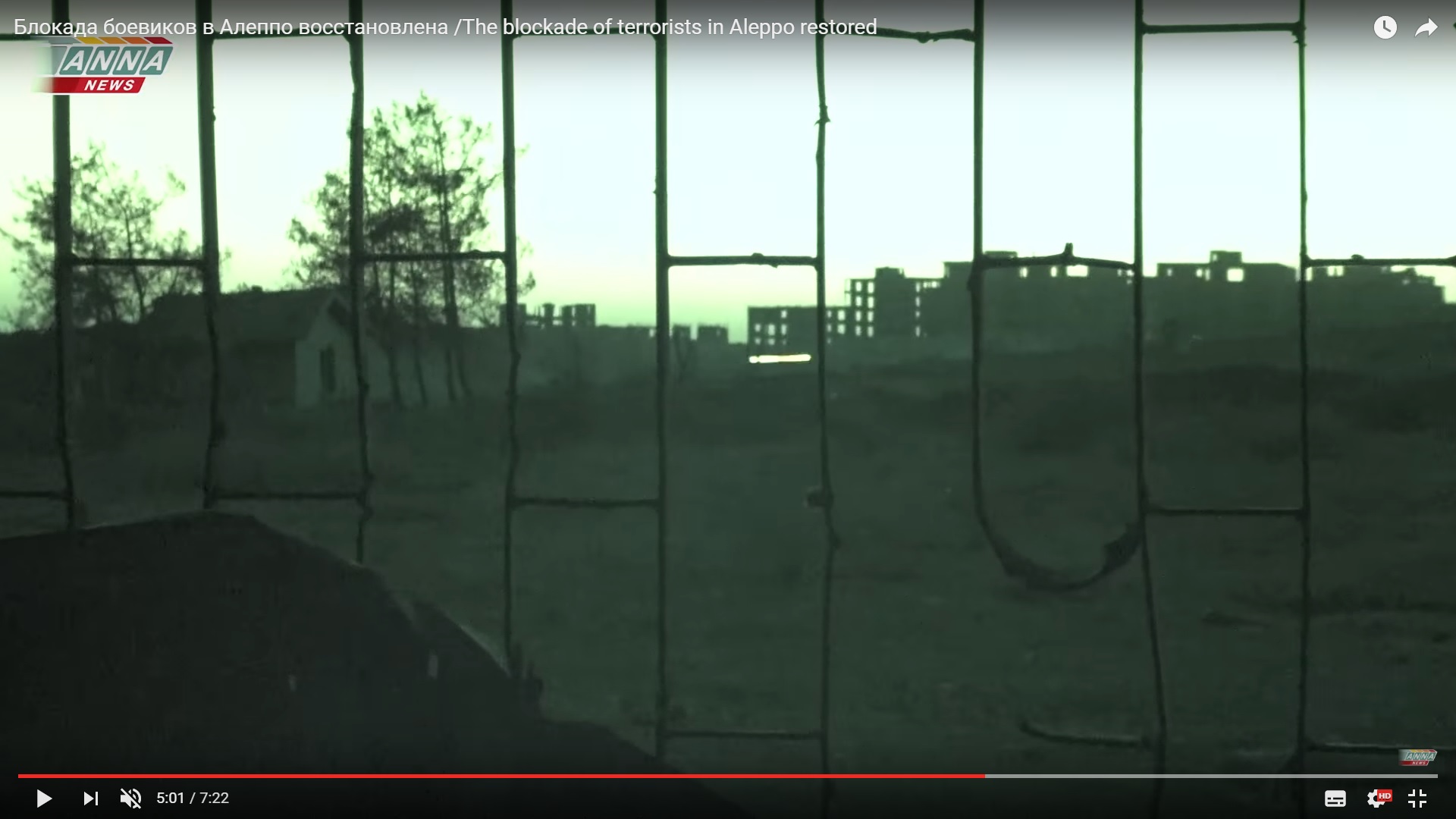
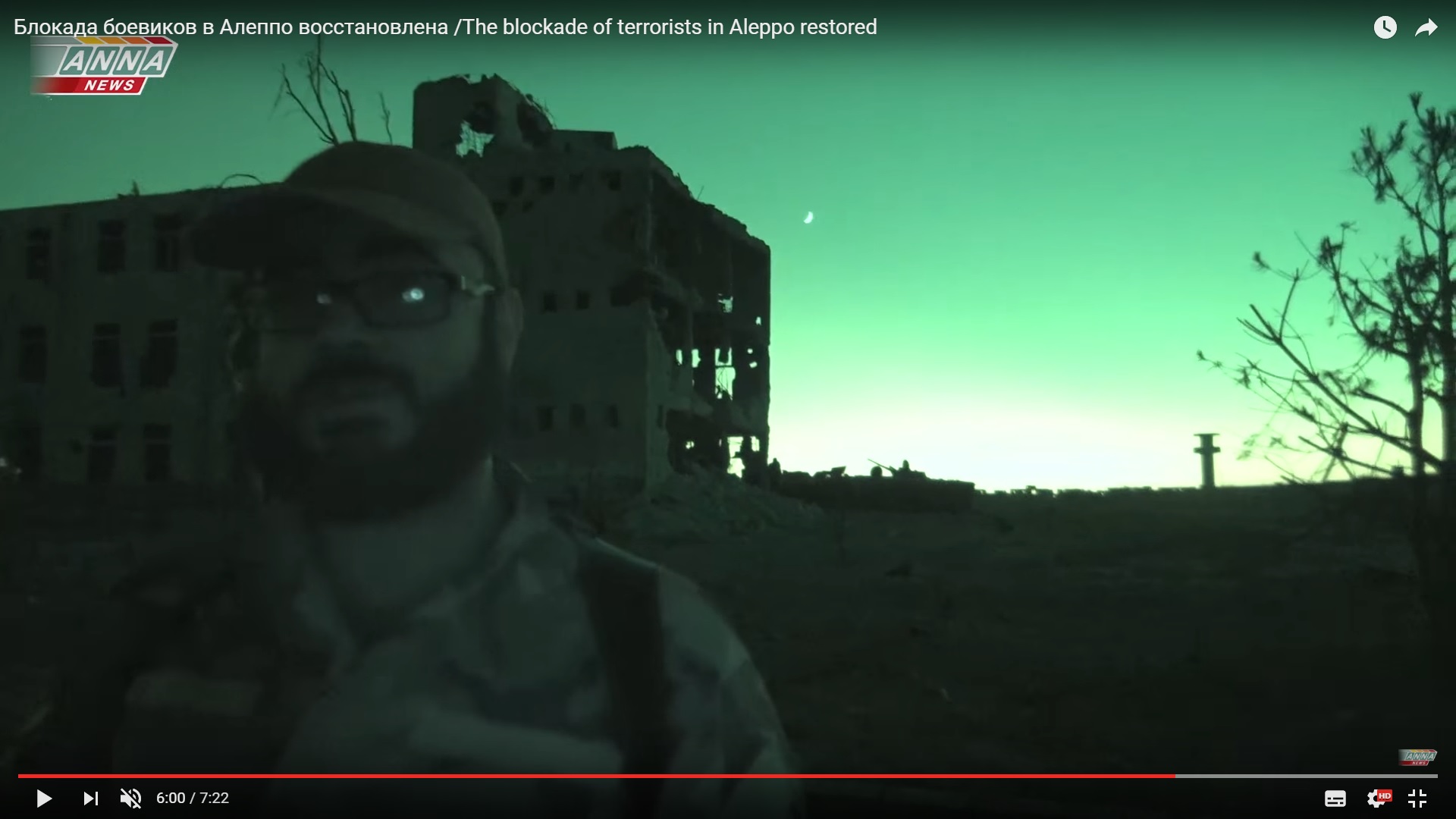
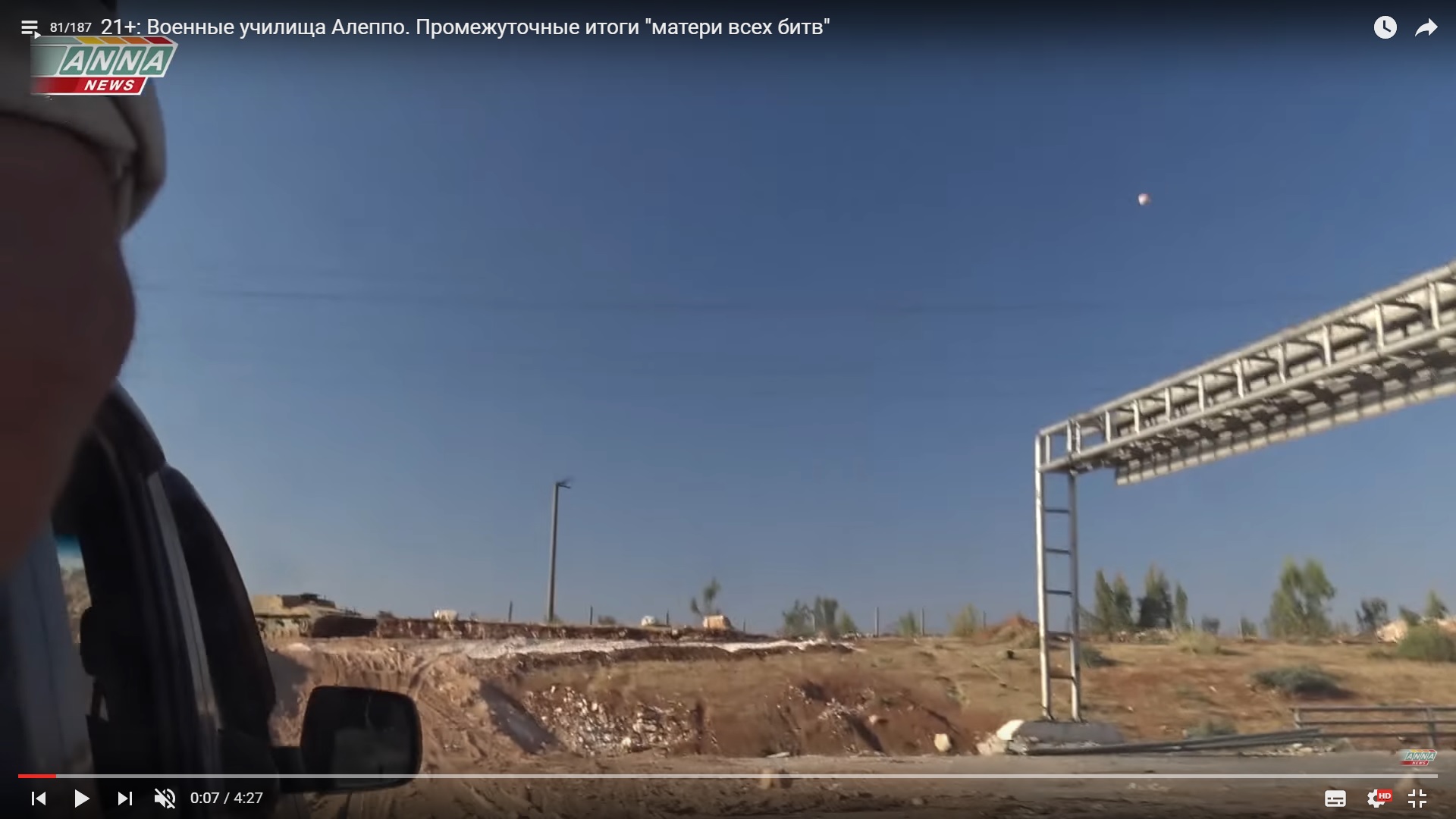
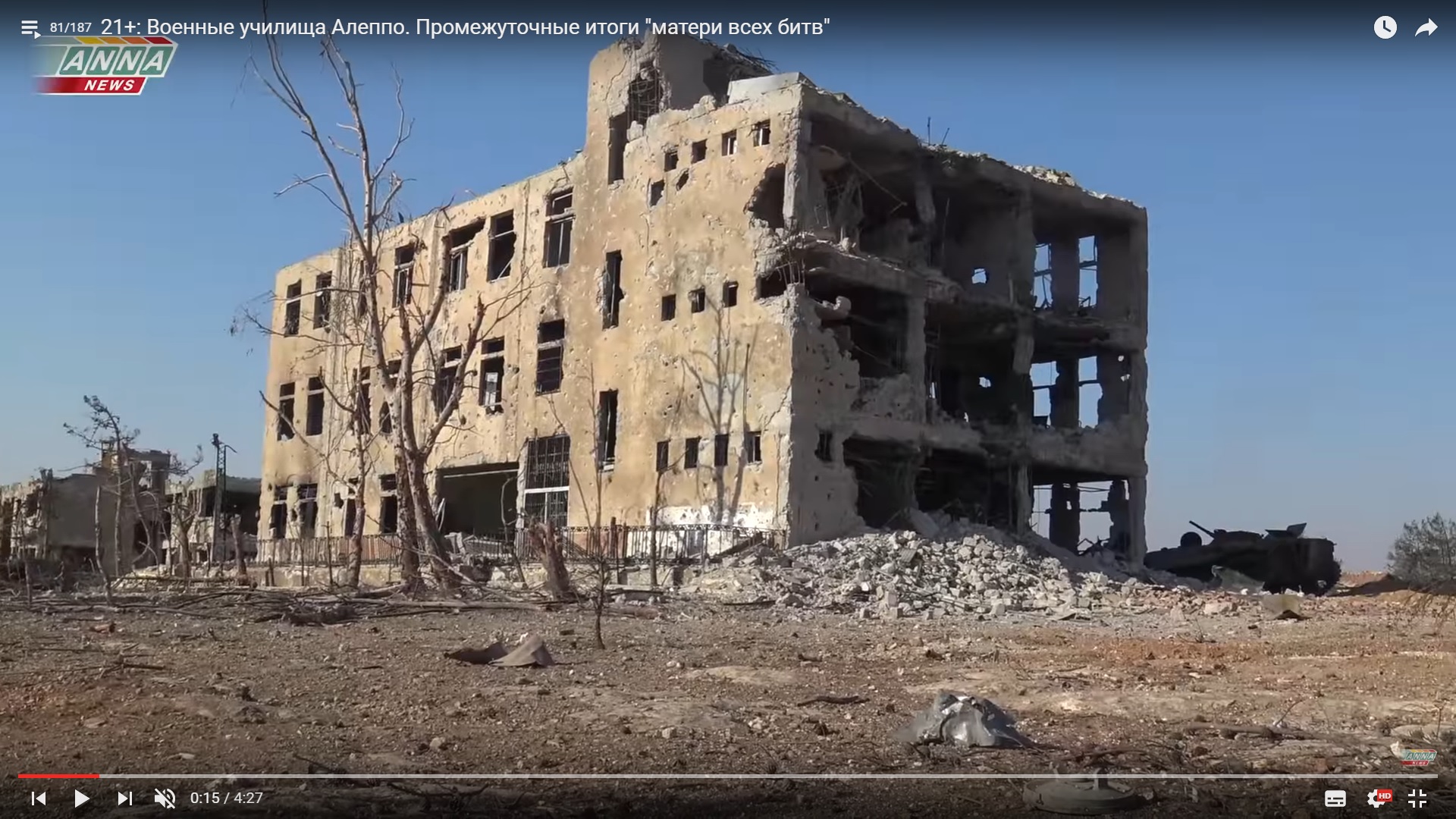
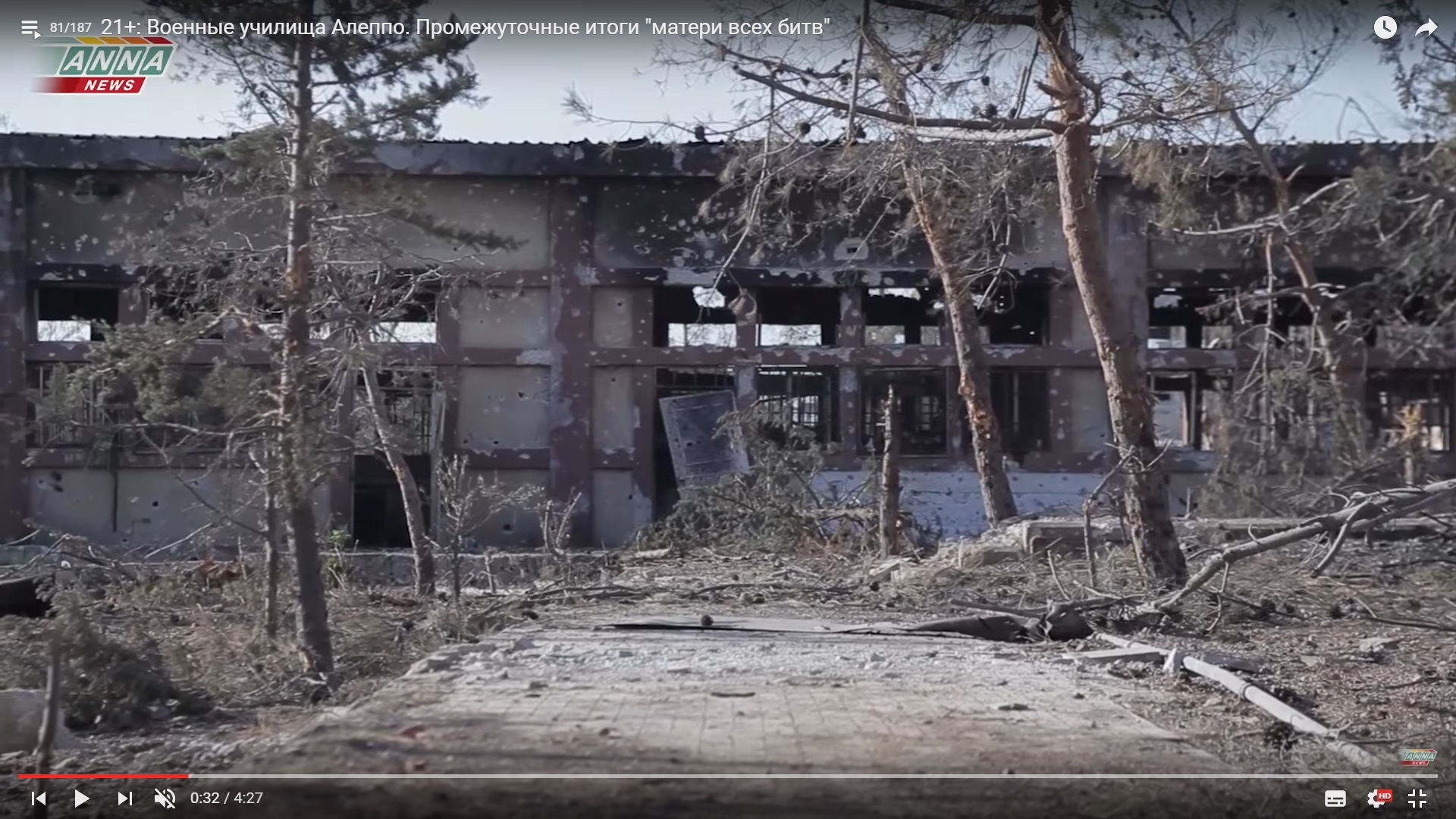
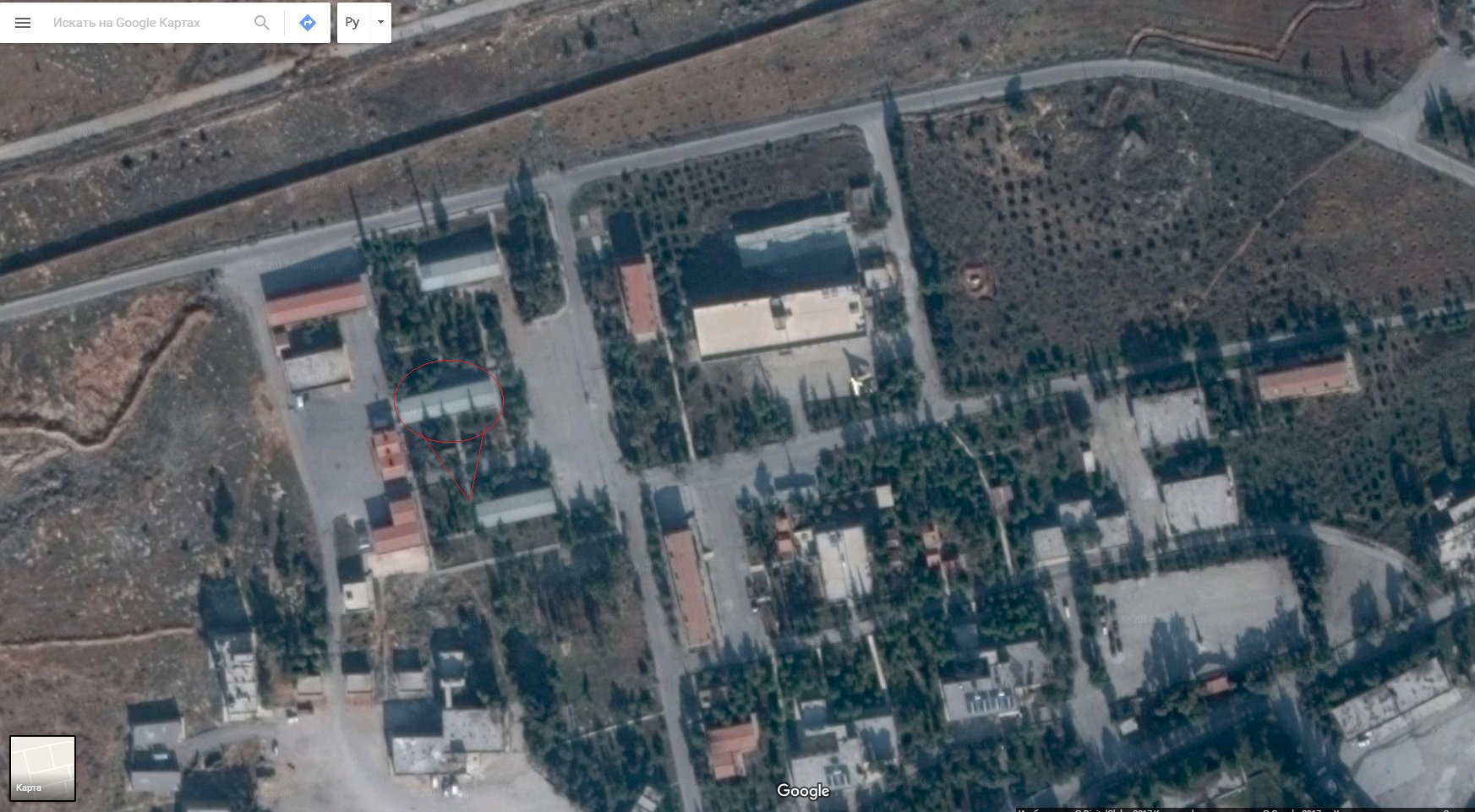
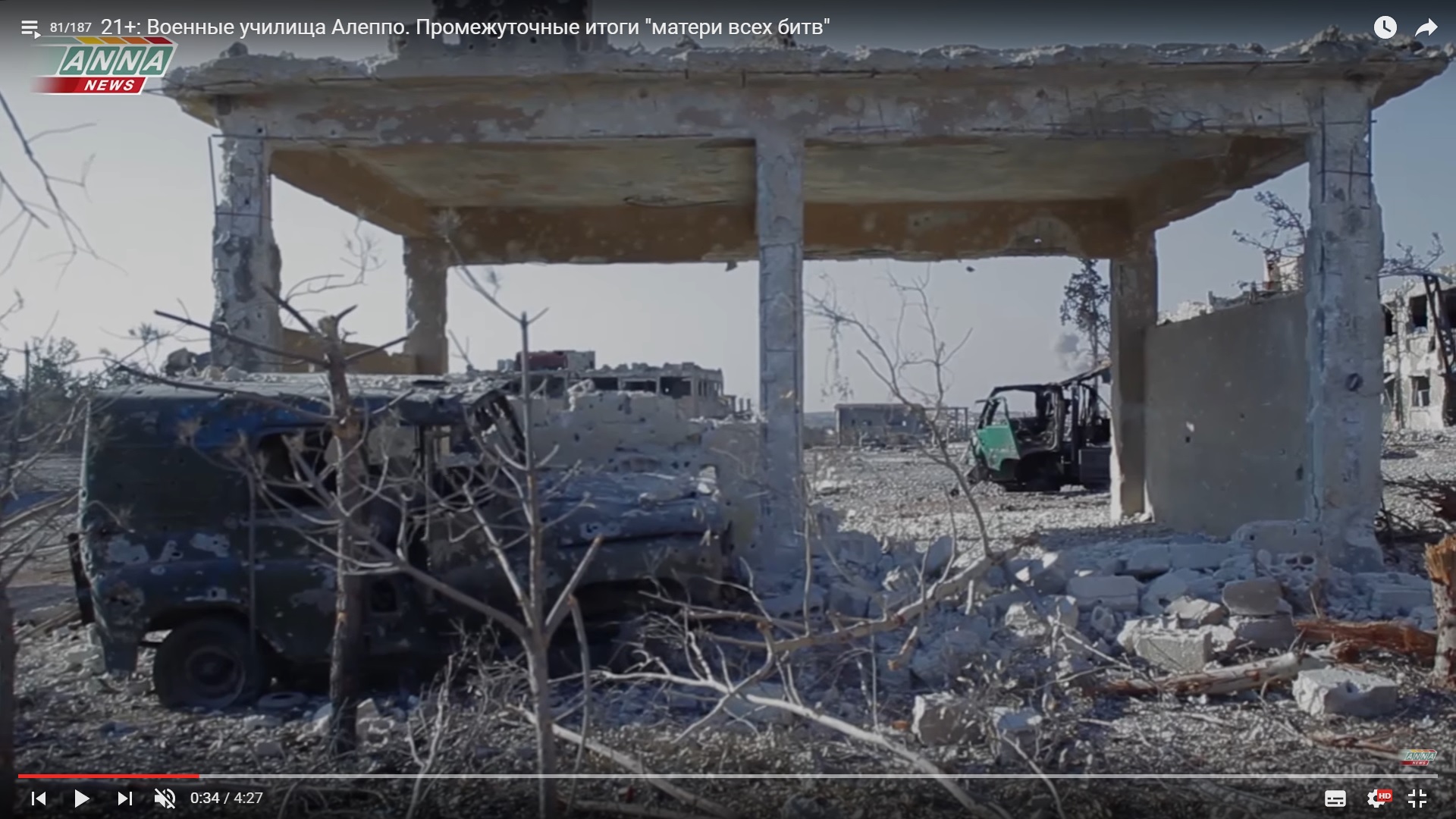
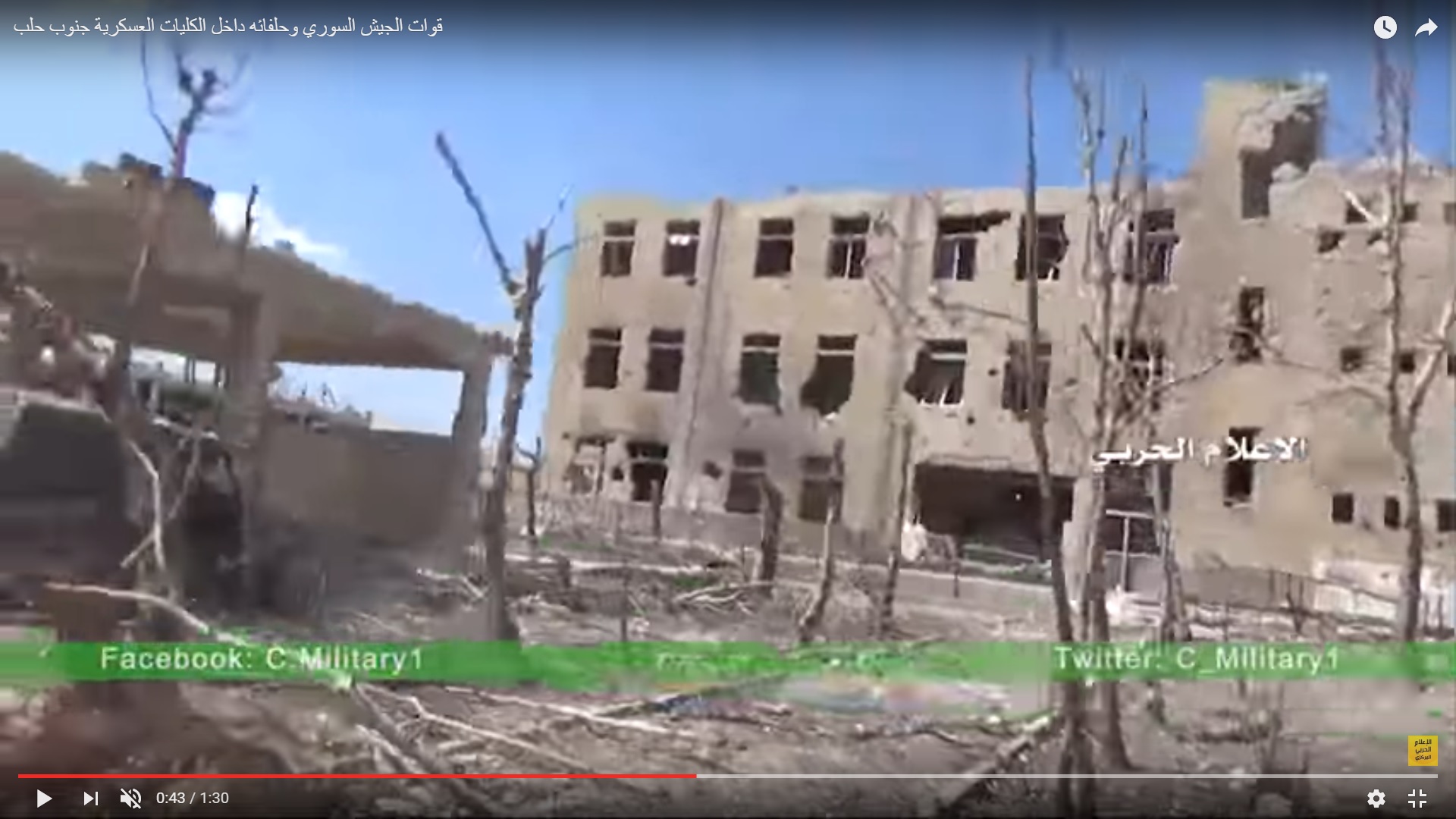


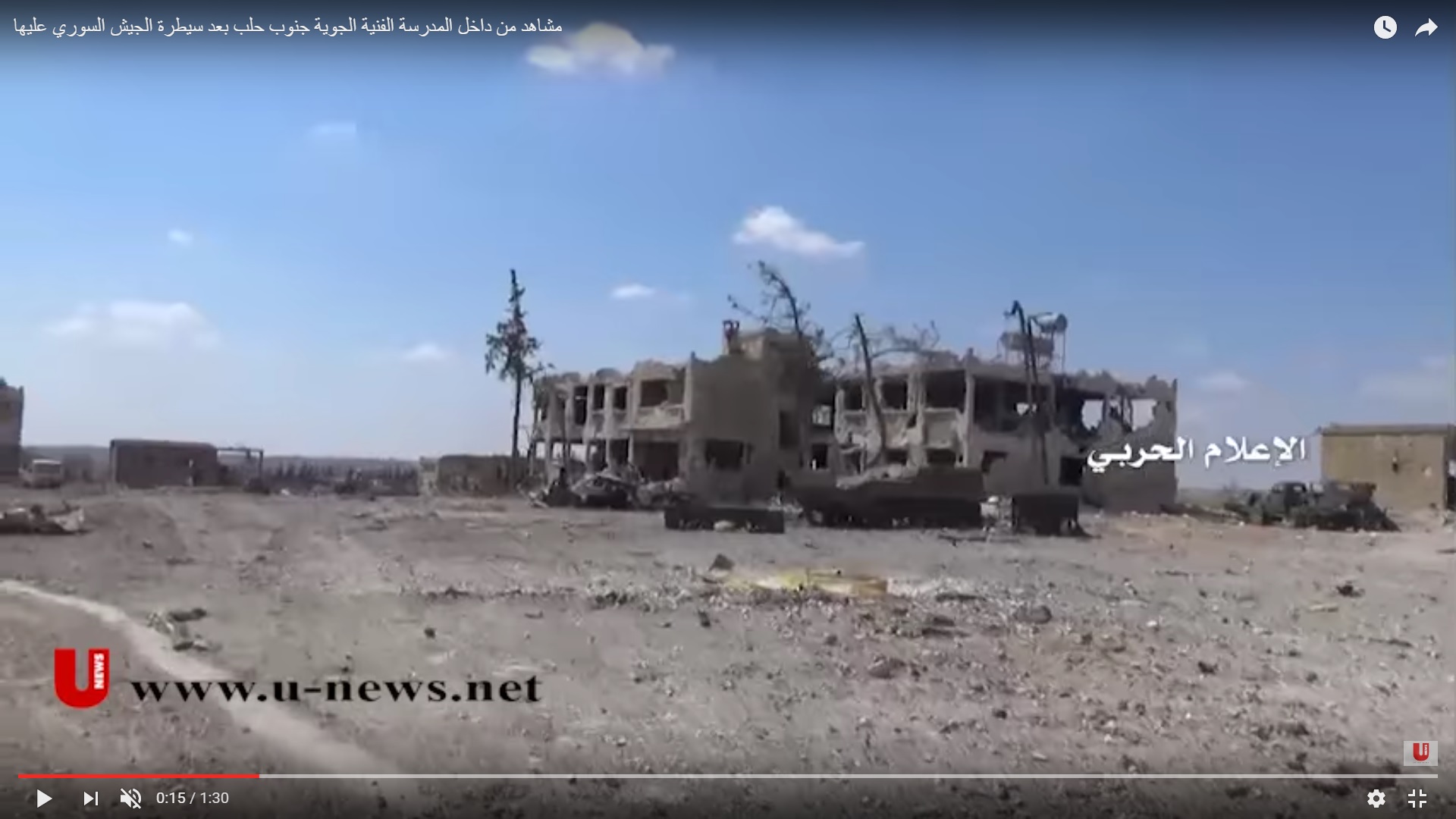
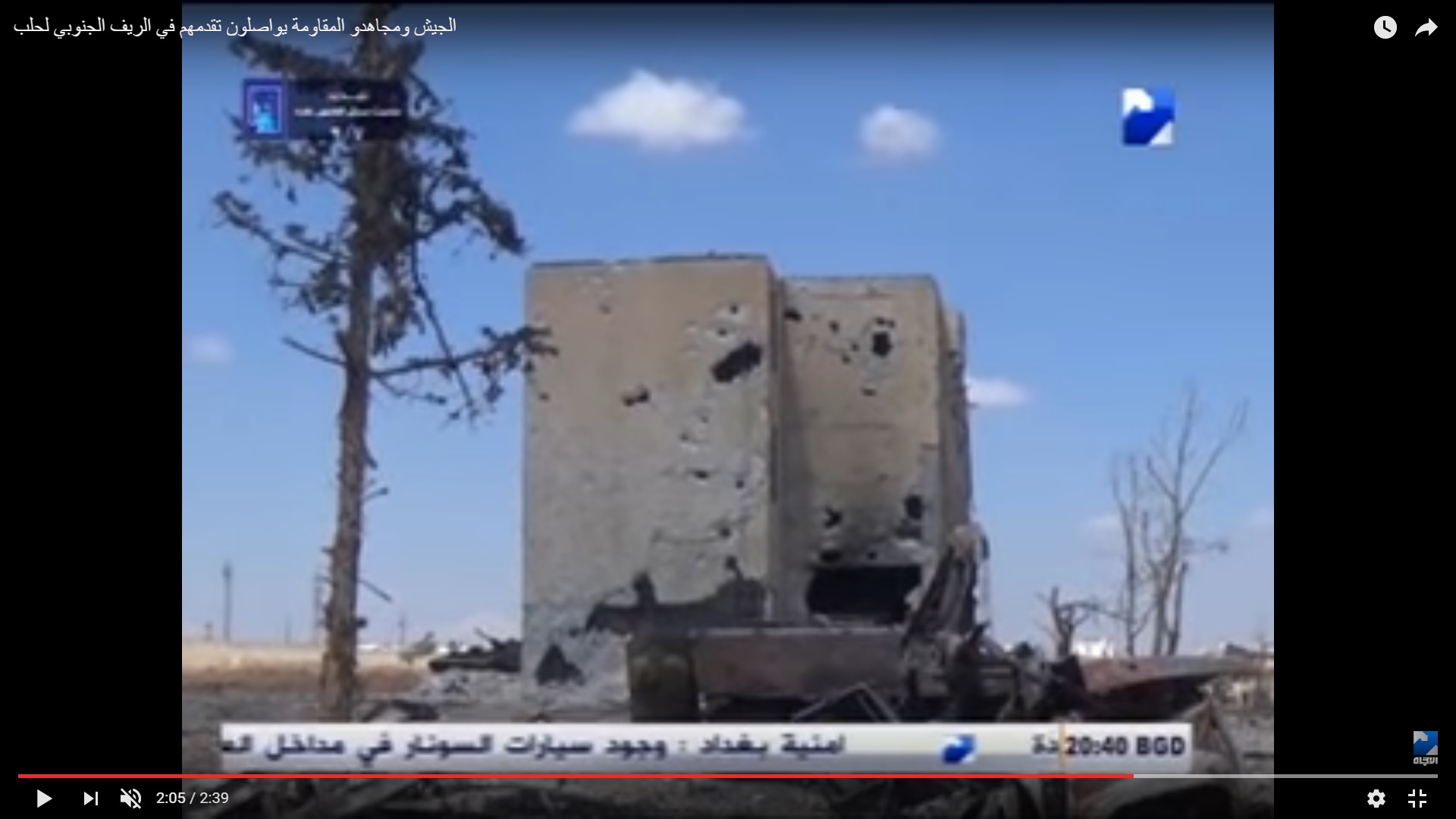














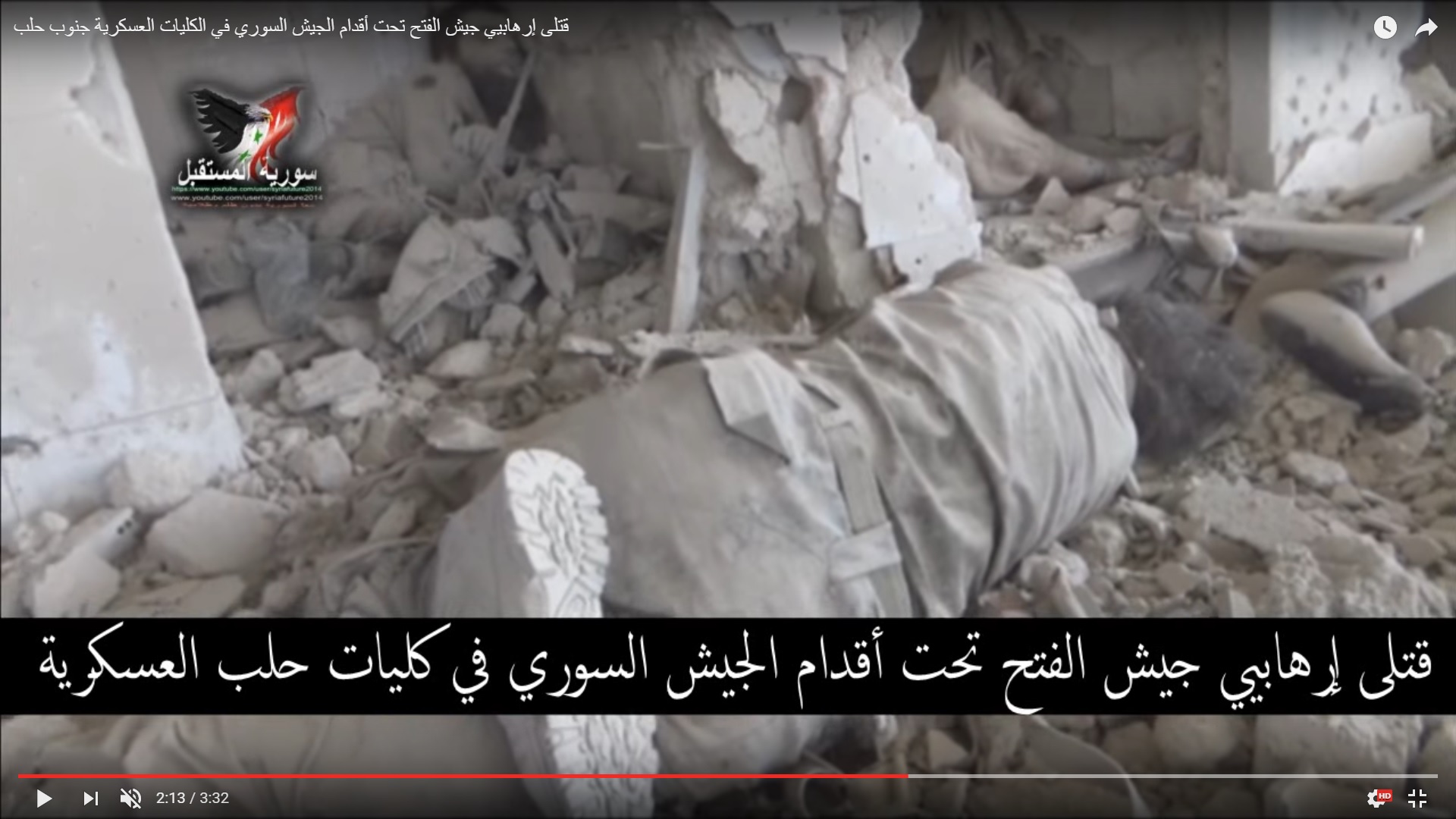
















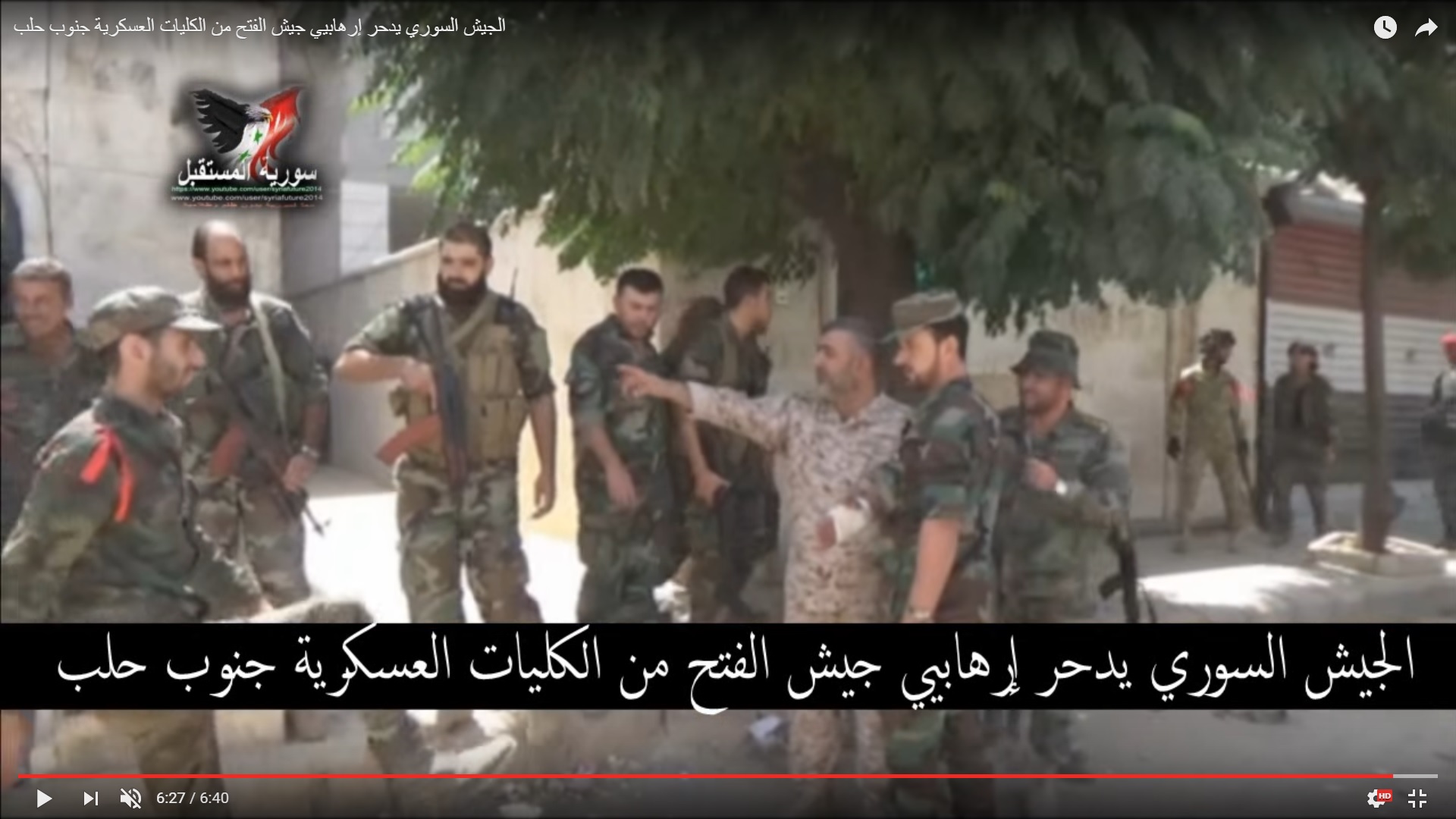

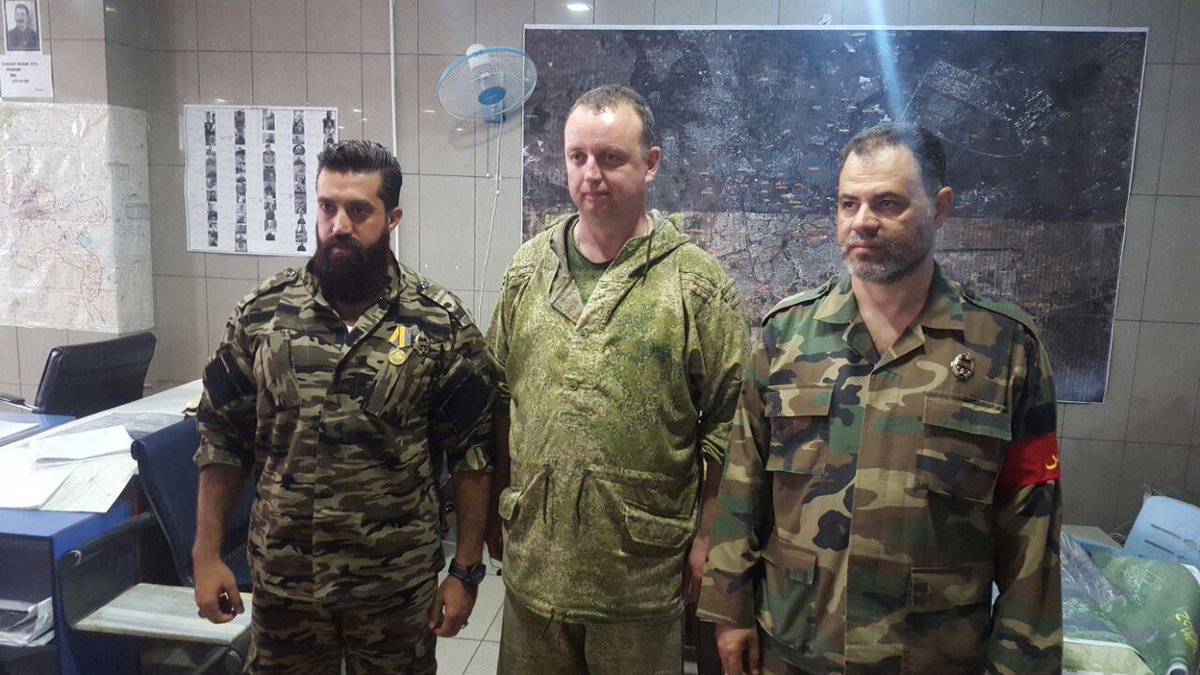




Wow, another amazing piece which took a lot of work and patience. Hope to see more work from these people!
There is only last part to go
Keep them fighting Donald and Vladimir. Its good for arms sales.